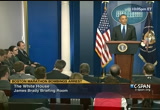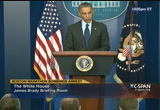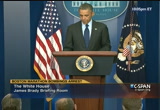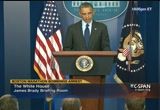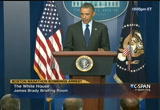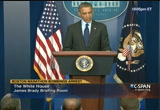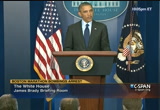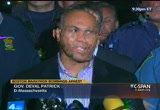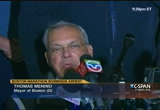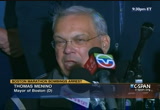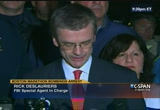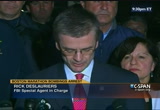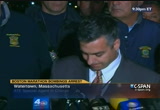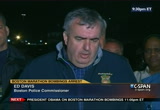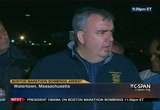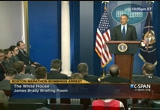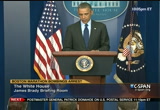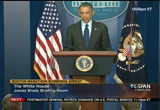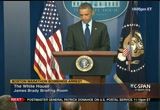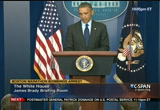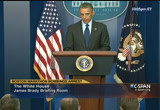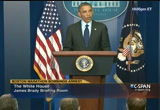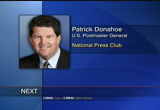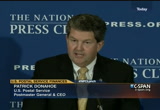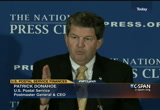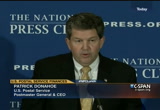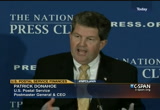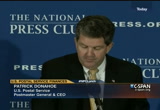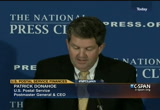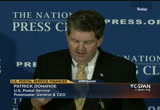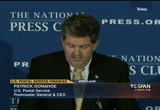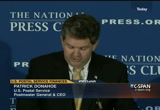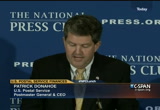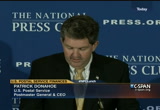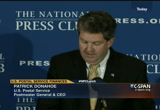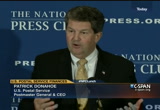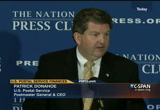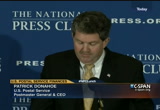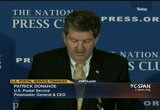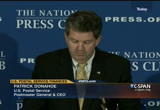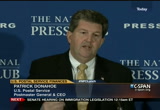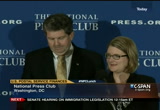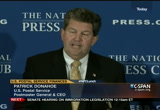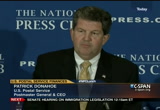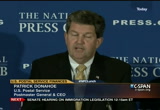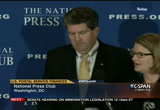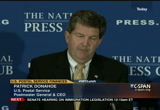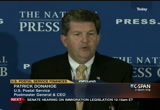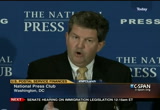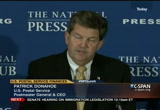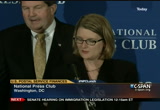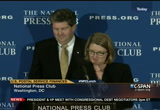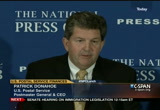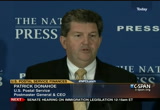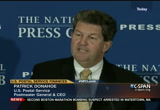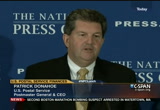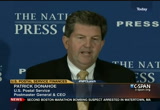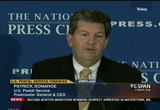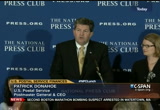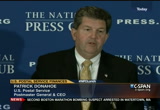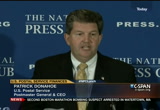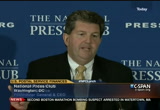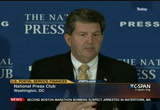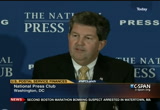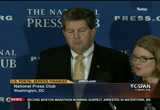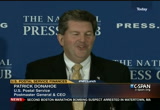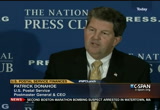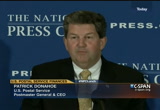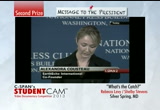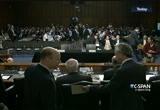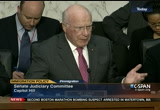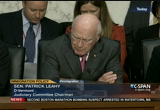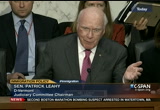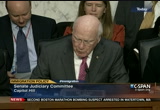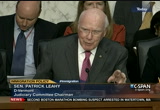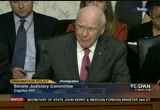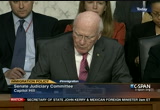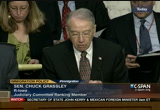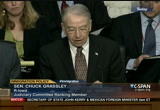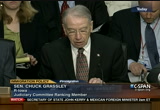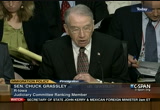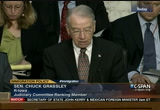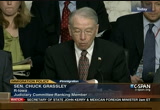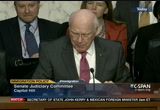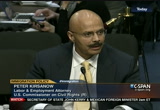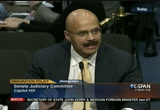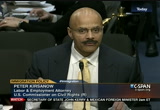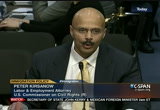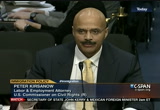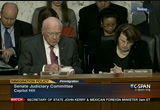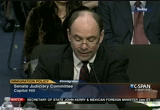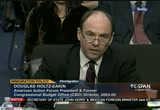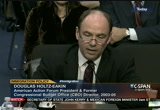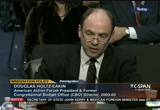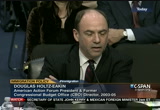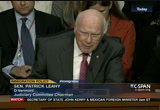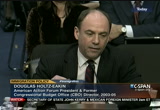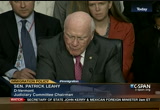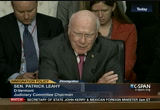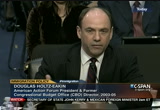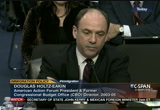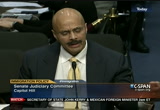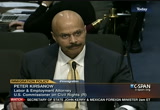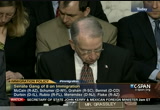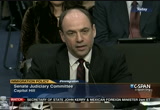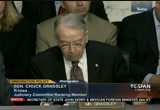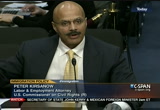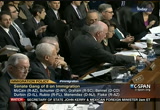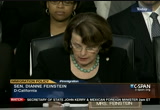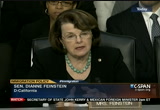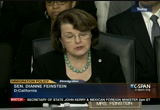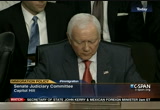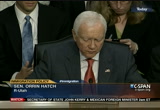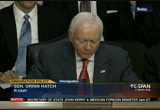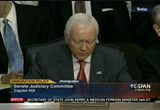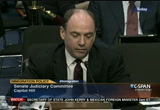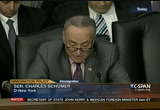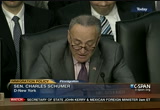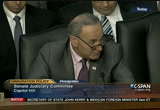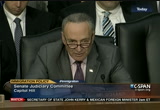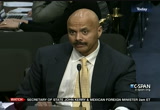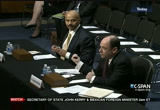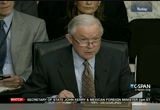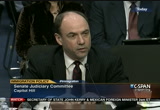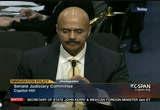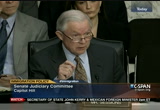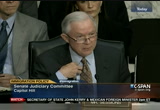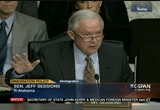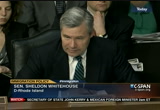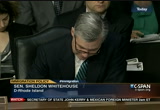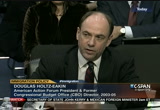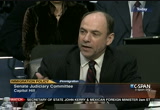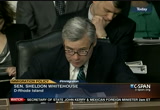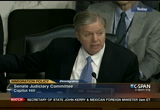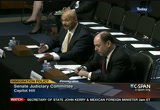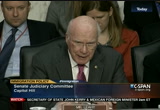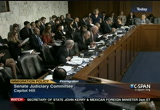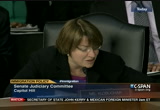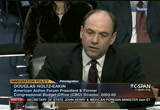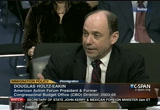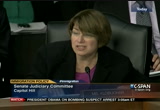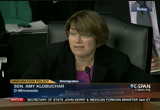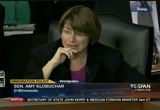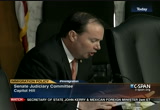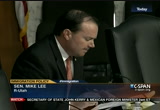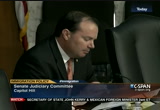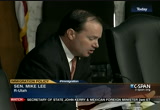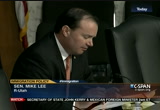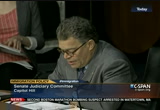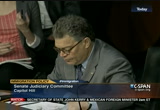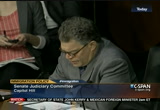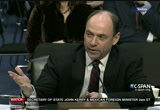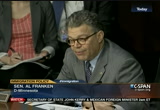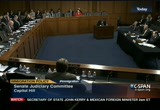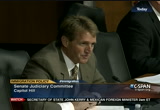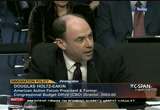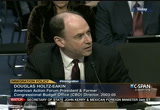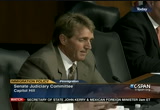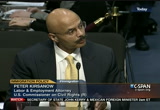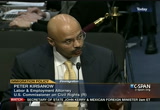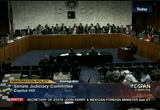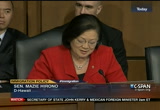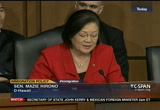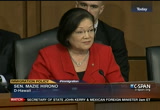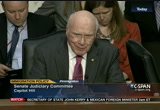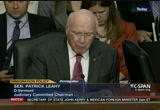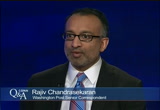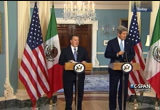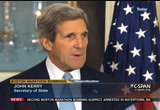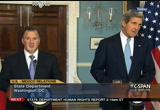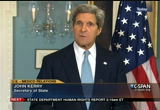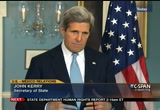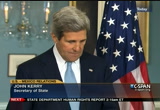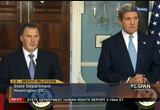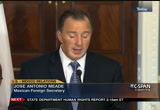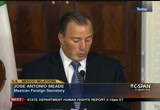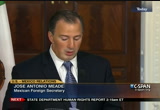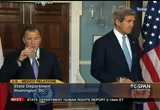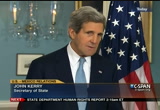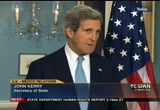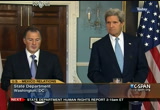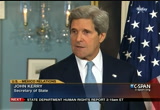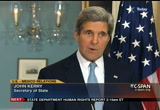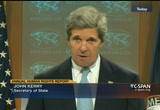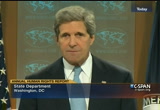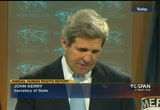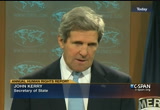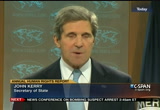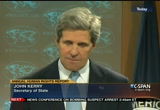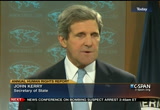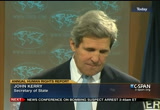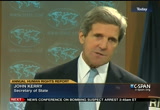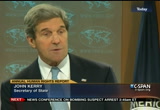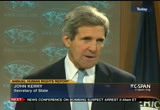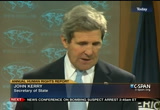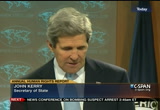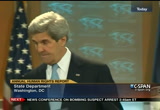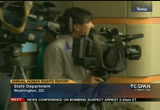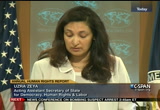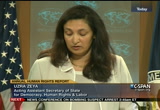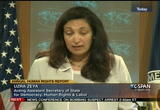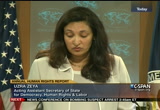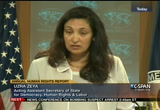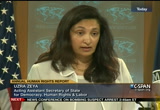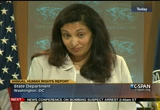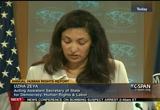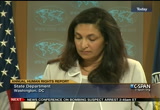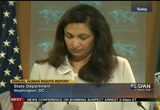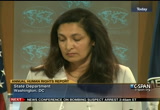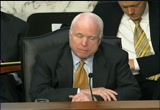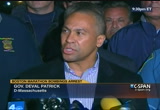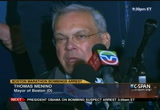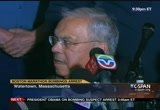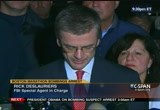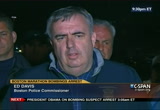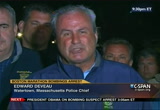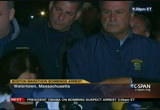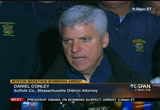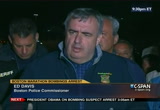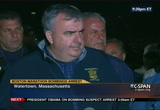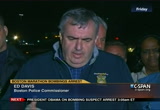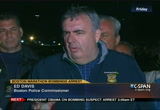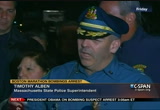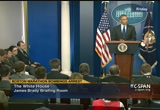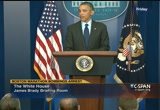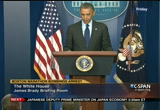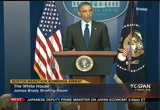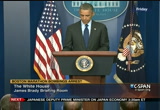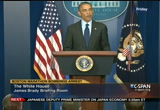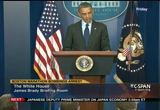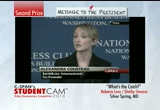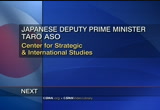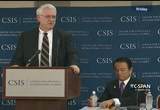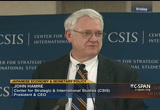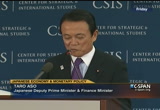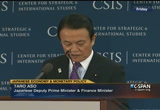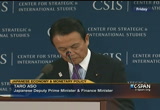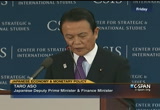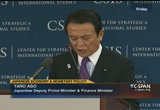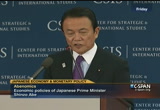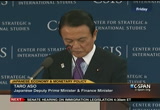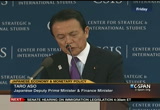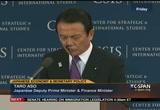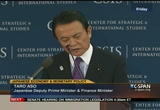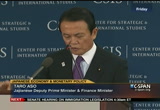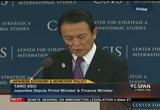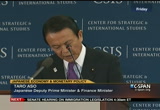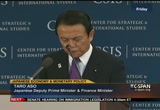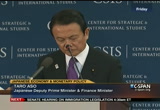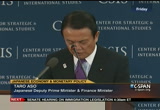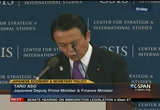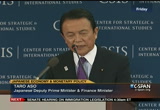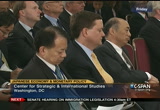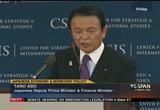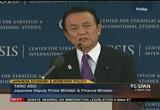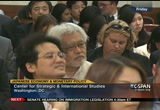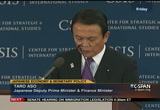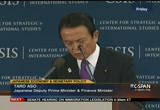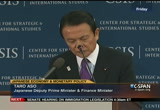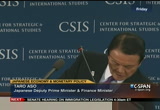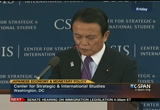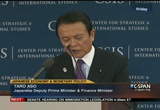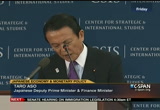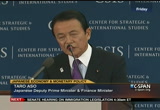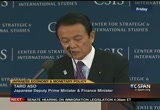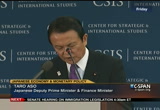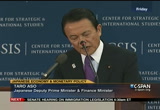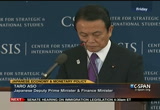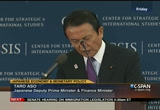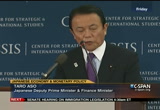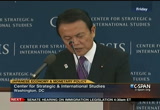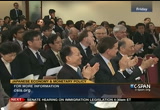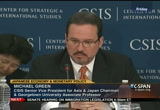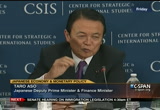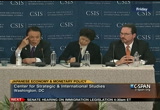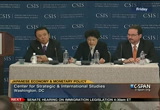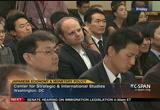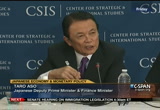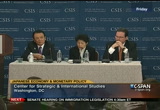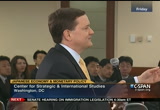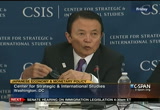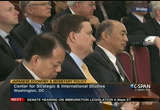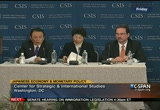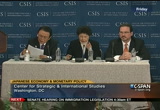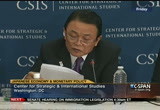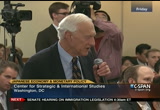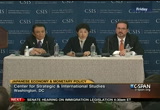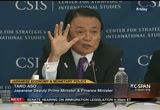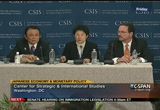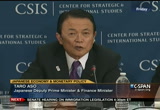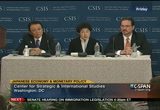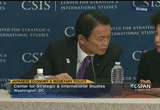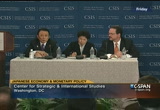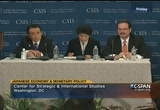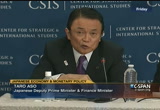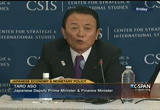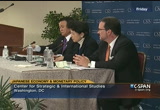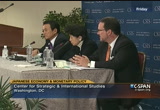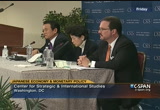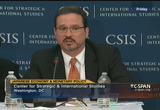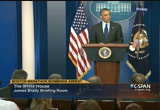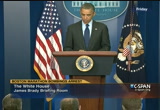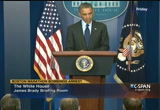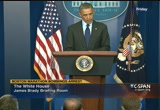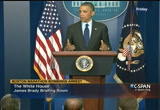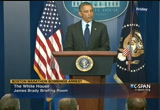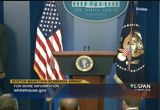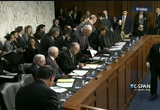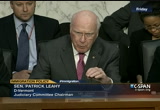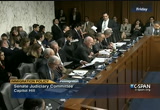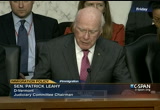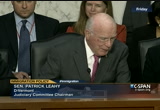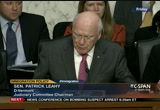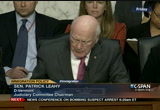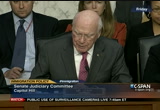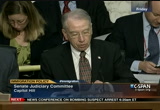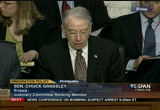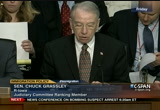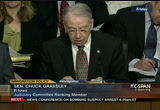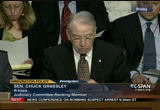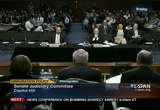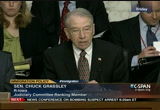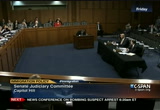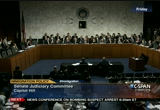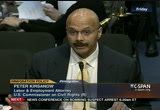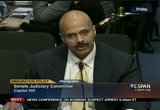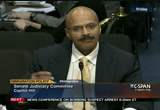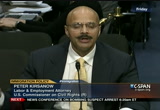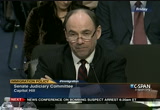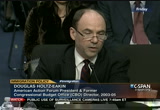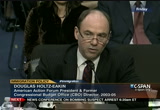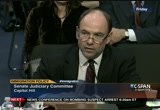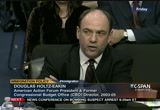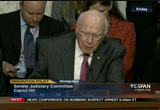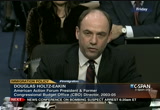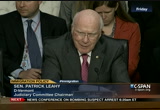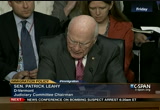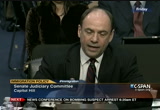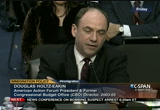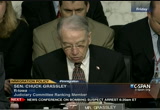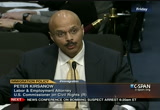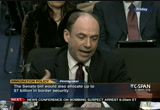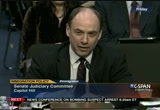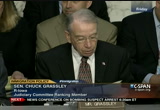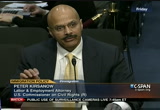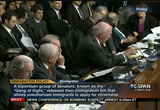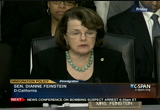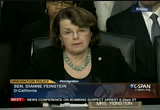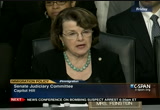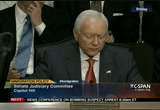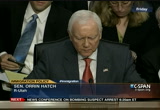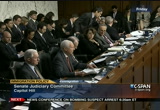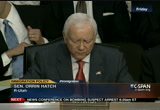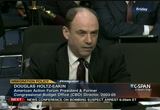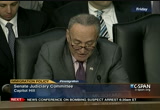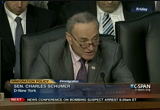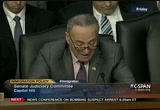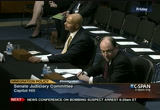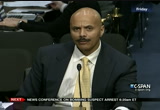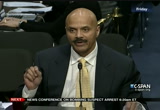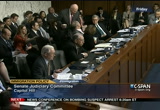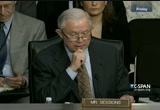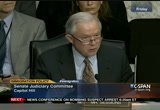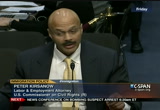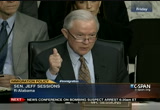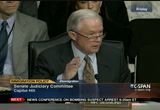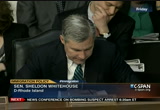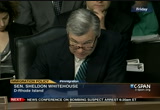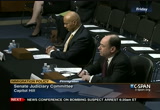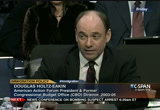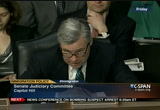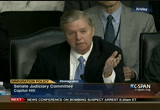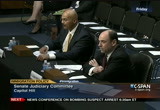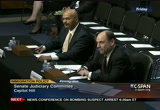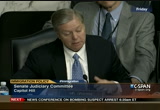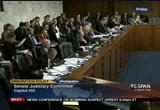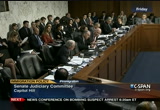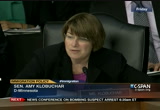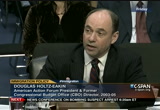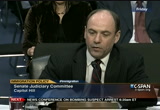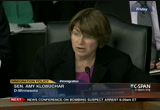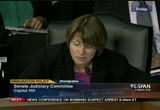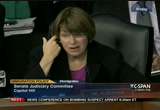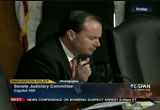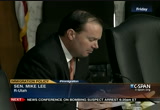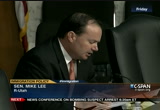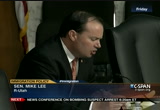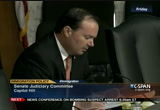tv Politics Public Policy Today CSPAN April 19, 2013 10:30pm-6:01am EDT
10:30 pm
of over 200 rounds of gunfire and there were handmade hand grenades that were thrown at the officers. this is the stuff in an urbans police department is almost unheard of. they protected the community and they protected each other when they responded to the scene. i'm so proud of the actions of the watertown police, the state police, the boston police, it has been an incredible team. >> did he have a weapon in the boat? >> i was told there was an exchange of gunfire, i was not there when he was taken out of the boat. >> no miranda warning, do you want to explain that to us. > that is a federal issue. >> what was the question?
10:31 pm
>> there was no miranda warning given they were claiming a public safety exception. >> there is a public safety exemption involving acts of terrorism. so the government has the opportunity, right now. i believe that the suspect has been taken to a hospital. thank you. yes? i'm sorry? >> are you going to seek the death penalty? >> this is still an active, ongoing investigation. we're going to be reviewing up of the evidence before that kind of a decision is made in terms of whether or not to seek the death penalty you review all of the evidence and it is a very thoughtful, long process that is engaged and it is the attorney general of the department of justice that makes that final decision. i'm sorry?
10:32 pm
karen? >> can you talk a little bit about when you were on the scene, was he moving around? how did you know it was a chance to take him into custody? >> we know he did not go straight to the boat. when we set up the perimeter with the best intentions with a lot of information. we found blood inside the car that he abandoned so we had no information that he got outside of the perimeter. as we said, it was chaotic early this morning. we had a police officer shot, bleeding. so there was a lot of things going on. we thought we had the perimeter solid but we were one block away. he had to be moving a little bit after he was behind a house for a period of time that we know. >> how did you know you can take him into custody? was he moving around? were you able to watch him?
10:33 pm
>> the reason we knew -- our helicopter detected the subject in the boat. we have what is called a forward looking infrared device on the helicopter. he was underneath the cover on the boat but there was movement from that point on. the helicopter was able to direct the teams over to that area and ultimately take him to custody. >> it was outside the perimeter during the day. they discovered the individual inside the boat and it resulted in our response. iw h condition
10:34 pm
but i don't know to what extend. i think we took enough questions for now. > thank you. >> the f.b.i. has updated the wanted poster for the second suspect in the boston marathon bombings. he is in custody in serious condition in a boston area hop. the department of justice says the suspect has not been read is miranda rights. you can read more online at talking moments memo.com. after authorities in boston held their news conference president obama spoke from the white house.
10:35 pm
>> good evening, everybody. tonight our nation is in debt to the people of boston and the people of massachusetts. after a vicious attack on their city the people of boston responded with resolve and determinations. they did their part as citizens and partners in the investigation. boston police, state police, and local police responded with professionalism and bravery over five long days. tonight, because of their determined efforts we've closed an important chapter in this tragedy. i've been briefed earlier this
10:36 pm
evening after the attacks on monday, i directed the full resources of the federal government to be made available to help state, local authorities in the investigation and to increase security as needed. over the past week, close coordination over state and local officials to track down leads has been critical to this effort. they all work as they should, as a team. we are extremely grateful for that. we o'a tremendous debt of gratitude to all of our law enforcement professionals. these men and women get up every day and they show up every day they are going don't always know what to expect. our thoughts thare wi the victims and we pray if you are eir recovwe send our prayers e
10:37 pm
collier family. police rn to be a officer. he was just 26 years old. his family said he died bravely and he committed his life to serving and protecting others. obviously, on the there is many other answered questions. among them, why did young men who grew up and studied here as part of our communities and country resort to such violence. how did they plan an carry out these attacks and did they receive any help? the families of those killed so senselessly deserve answers. the wounded, some of whom have to learn how to stand, walk, and live again, deserve answers. so i've instructed the f.b.i. and our intelligence community
10:38 pm
to continue to deploy all of the necessary resources to support the investigation, to collect intelligence, and to protect our citizens. we will determine what happened, we will investigate any associates that these terrorists may have had and we'll continue to do whatever we have to do to keep our people safe. one thing we do know, is whatever agenda drove these men such heinous acts, they cannot prevail. they have already failed. they failed because the people of boston refused to be intimidated. they failed because as americans we refuse to be terrorized. we will never waiver from the character and the compassion and the values that define us as a country. nor will we break the bonds that hold us together as a
10:39 pm
that american spirit includes staying true to the unity and the diversity that makes us strong like no other nation in the world. in this stage of instant reporting, tweets, and blogs there is a temptation to latch on to any information, sometimes jump to conclusions. when a tragedy like this happens with public safety at risk and the stake so high it is important that we do this right. that's why we have investigations. we have courts. we don't rush to judgment about these individuals and certainly not about entire groups of people. one thingha
10:40 pm
greatest nation on earth and what makes boston such a great city, people of every faith, every ethnicity and every corner of the globe, we welcome all of them. tonight, we think of all the wounded still struggling to recover. certainly we think of krystle lingzi lu,e think of we think of martin richard. their lives reflected all the diversity and beauty of our country. great re sharing a american experience together. finally, let me say even thgh so much attention has been focused on the tragedy in boston, understandably. we've seen a tight knit community in texas devastated by a terrible explosion.
10:41 pm
i want them to know that they are not forgotten. our thoughts, our with the people of west, texas where so many good people lost their live, some their homes, many are injured, many are still missing. i talked to governor perry and the mayor and i've pledged that the people of west will have the resources they need to recover and to rebuild. i want everybody in texas to know we will follow through with those commitments. all in all it has been a tough week. we've seen the character of our country once more. we have the resilience and the courage to overcuck this as one visible,der god, indie
10:42 pm
with liberty and justice for all. hank, everybody. >> thisheed.b.i wantedos the second suspect in the boston marathon he is in cust serious ondition at a boston hospital. >> we are so grateful to bring julls and closure to this case, to those families who lost loved ones or suffered injuries that they have to live with for the rest of their lives, for a police offer, a young man starting a career at m.i.t. and a police officer with the mtba o almost lost his lifes --
10:43 pm
life and for an entire neighb tha lived in fear tonight. i want to thank all of the partners who worked tirelessly over the last four days, including the f.b.i., the transit police, our brothers with the boston police department, the u.s. attorneys office, andporte've gotten from our governor in the dst four we're exhausted, folks. but we have a victory here tonight. let's not for goat the people along the way. hanks very much. >> on behalf of krystle campbell, martin richard, lingzi lu, on behalf of the m.i.t. officer who was lost last night and the transit police offir who was injured, on behalf of the hundreds of people who were hurt by the explosions at the marathon, i want to say how ecchge, to
10:44 pm
l t law eorce wrk so well and together, together to bring us to tonight's conclusion. it was a very, veryicated case. it was a challengingase and there aril questions remaining to be answered. but as the colol said because of the extraordinary collaboration and croorp croopion by all of the -- w ration- peration have susct in custody night. their participation in this investigation by reviewing photographs of their own and others that were hundred through media ae thanu for at. helping us narrow in on these suspects. they were helpful and patient
10:45 pm
d we're grateful for that as well. tonight, i think we're going to easy. >> the zpwoffer and the colonel have put it well. tonight we feel a tremendous sense of gratitude and relief. the ordeal that this community and this neighborhood has endured over the last 24 hours. tonight we can veep a bit easier. all the unpredictable and horroric acts that have occurred over the last several days starting with the terrible bombing attacks that occurred on monday. here we are and notge the crim have occurred over the last
10:46 pm
several days. e victims of the bombings, crystle, sean collier, and the officert is fighting for his life, our prerwith tir families. this has been an very active and ongoing investigation. r some of you tonight is a osure for me, the journey continues. this continues to be an ongoing and active investigation as we sought all the details and continue to evaluate a tremendous amount of evidence and file our formal charges. i've never been prouder to stand with a group of law enforcement here from the colonel to the commissioner to my federal
10:47 pm
colleague at the f.b.i., all the federal agents, the state and local departments who have worked so hard since the attacks on monday. so committed and putting their lives on the line as we fought the last 24 hours to try to get a suspect into custody. so my journey and my officers journey begins and this investigation will continue. so we'll not be able to provide the details that you may want at this time but as the days continue you will get answers to those questions. >> thank you. i just want to say briefly, thank you, thank you, thank you. thank you to the law enforcement officials with -- for working together. that's when government works the best. i want to thank the citizens out there. i've known week,
10:48 pm
what has happened out there because of the bombing at the marathon. but because of the work of so many individuals we have a conclusion that we're all satisfied with. also, remember the folks that have lost their lives in the past week. we're a better city than we have been in the past week and we'll get better. all the folks out there in the media, thank for the support. some days you said to us why? we've been working hard and i spent a lot of time with the law enforcement officials and they worked so hard to come to the conclusion tonight. we say thank you to them for the work they did tracing down every one of the leads in that regard, which is so significant that brought us to the end of the case today. now it is up to her job to bring it to the federal courts.
10:49 pm
i feel so good about this, i tell you. i'm so happy. as the people of the boston area people can sleep tonight because of the work of the individuals. s -- >> good evening. it seems like many months since the day of the boston marathon mare a on thises but it has been five days since the tragic explosions that took three lives, critically injured over 180 spectators and instilled terror and fear an the citizens boston and elsewhere. many communities can breathe a sigh of relief knowing that two perpetrators who caused so much pain and an anguish is no longer
10:50 pm
a threat to our personal safety and our communities. ogether with the action of our terrorism task force many, on the stage with me, the f.b.i. and our partners remain vigilant and continue to sift through thousands of leads and tips to reach this moment. this was a tense investigation and i do emphasize a tense investigation. as a result of that, justice is being served for the victims of these terrible crimes. i want to express the profound thanks for bringing us to this moment this evening. no one agency accomplished this important task alone. i thank you for the support of our media campaign, which public sized the photos.
10:51 pm
thank the support for the -- four days ago my city was ruthlessly attacked. there is no explanation of this. i spent the last several days of looking at hundreds of hows of videotape. i got to see how brutal the attack was over and over again. i got to see show who what the police officers who responded to the scene along with the medical personnel did to put people back together. tourniquets, stopping the pleading with their hands, putting a man who was on fire out with their hands. it makes me proud to be a boston police officer. it makes me proud to be a part of this team. e f.b.i. would not be more
10:52 pm
then to bringopts the governor and mayor together leading the city of boston and responding to. i want to say that the is stizzes of this city have been incredible. they have been patient, they have endured an enormous amount of heartache over the past few days. thank you. >> as the police chief of watertown i can't be prouder of my community and the men and women of the police department. what we've been through in the last 24 hours i would not want to see another police department go through. from the support we've had from all the different agencies over
10:53 pm
the last 4 hours has been incredible. to see so many agencies working together has been great. i spoke on the people until watertown before that i can't thank enough, the community stood strong and it was a call remained esident that vigilant. we got the call and we got the guy. you did everything and more that we've asked. extremely proud of law enforcement today and what we've accomplished. thank you. >> i just want to thank all of those who sent their thoughts and prayers to officer donahue and his family. it was deeply appreciated. thank you. all of the lawnd
10:54 pm
enforcement agencies that took part in this. this is dedication and commitment at its best and i'm proud to be a part of it. > special agent in charge of a.t.f. >> today the entire world witnessed the commitment to at preending these offenders. make no doubt this combined effort will never cease in every town, every neighborhood in our inflation. the prayers from every employee will continue to go out in the victims as they heal from the senseless act of violence. may god bless the citizens. >> thank you very much. i was listening to the police action all afternoon on the radio and i would like to join or add my voice to those who
10:55 pm
came before me to say what an extraordinary police operation across all jurisdiction that i was able to within today. in our business, it is about accountability and i can't say how happy i am, how am that the second subject is taken alive. this will ensure the accountability for the victims and their families. congratulations to all the law enforcement for a job well done and ahead is account ability. >> how did the events transpire at the boat? >> there was a call that came into the police. three boston police officers along with state troopers and f.b.i. agents responded to franklin street. a man had gone out of his house after being out of his house all day after abiding by our request to stay inside. he walked outside and saw blood
10:56 pm
on the boat. he looked in and saw a man covered with blood. he retreated and called us. we set up perimeter around that boat and over the course of the next hour or so we exchanged gunfire with the suspect inside f.b.i.t and we a had the made an entry into the boat and removed the suspect who was still alive in the boat. >> key you talk about the imperative of taking him alive. all always want to take suspects alive. >> when you talk a accountability, can you talk a why you wanted to take him alive? >> we always want to find out y it happen, and hold him to justice. >> how bad was he jine you ared?
10:57 pm
>> the f.b.i. negotiation team tried to talk him out. i don't have that information. >> that you got your guy, is this it? >> based on our investigation at this point in time, the citizens in this area can be confident that the threat has been removed. suspect is in serious condition at the hospital. >> you know these are the suspects that you're looking for? they did not rob the 7-eleven how did you know they were there? the suspects came to our situation after a vicious assassination of the police officer at m.i.t. a robbery that occurred.
10:58 pm
we have videotape from a gas station. the robbery was a carjacking. the car was taken from the scene. the officers engaged that car along with other officers and we put the case together. the man who found him at the boat said he was covered with blood. we assume the injuries occurred the night before. i don't know if he was struck at the boat. there was a house in new bedford that the hostage rescue team went into for the f.b.i. because we felt it was important for the investigation but the subpoena was not found there. >> can you tell us more about he [unintelligible] my assessment of that particular incident was that he was assassinated in his cruiser.
10:59 pm
>> do you know what he was doing there? >> he was responding for a call of durs. -- dushes -- >> we did not give an all clear. this was a serious and dangerous situation. we had no information that the suspect was still holed up in this particular area. he managed to elude us by being outside the perimeter that we set up. in truth, we told everyone this was a dangerous situation. they should be cautious. this is a dangerous time in the world. we have to use caution. that is what we ask people to do. thankfully, the man who found the suspect did the right thing, he called 911 and we took care of the situation. there is no report of explosives with him during capture.
11:00 pm
there was an exchange of over 0 rounds of gunfire, impro viced explosives last night. this is the stuff that in an urban police department is almost unheard of. these officers acted heroically and they protected each other when they responded to the scene. i'm so proud of the watertown police, the state police, the oston police, it has been an incredible team. i can't say -- i was told there was an education change of gunfire. i was not there when he was taken out of the boat. >> no miranda warning, can you explain that for us? >> the f.b.i. may want to explain that. that is a federal issue.
11:01 pm
>> what was the question? >> there was no miranda warning could we get an explanation for that? >> there is a public safety issue for acts involving terrorism. the government has an opportunity right now though i believe the suspect has been taken to a hospital. i'm sorry. what i indicated earlier is that this is still an active, an ongoing investigation. we're going to be reviewing all of the evidence. before that kind of a decision is made in terms of whether or not to seek the death penalty, you review all of the evidence and it's a very thoughtful, long process that is engaged and it's the attorney general of the department of justice that makes that final decision.
11:02 pm
i'm sorry. >> can you talk to us a little bit about what happened when you were on the scene? was he moving around? how did you know it was finally a chance to take him into custody? >> we know he didn't go straight to the boat. we set up the perimeter with the best intentions with a lot of information. we found blood in a car that he abandoned and blood inside a house in the perimeter. as we said, it was very chaotic early this morning. we had an -- to aid a police officer that was shot, bleeding. there were a lot of things going on. we thought we got the perimeter solid. we pretty much did that but we were one block away. but he had to be moving a little bit after he was behind a house for a period of time that we know. >> how did you know that you
11:03 pm
could take him into custody? has he been moving -- had he been moving around? >> our helicopter has detectived the subject in a bolt. we have a forward looking infrared advice on that helicopter and it picked up the heat signature of the individual even though he was underneath what appeared to be a shrink wrap or a cover underneath the boat. the helicopter was able to direct the tactical teams over to the boat and ultimately take him into custody. yeah, he was outside the perimeter during the day. this was the act of a citizen that went out and discovered this individual in the boat and ultimately called the watertown police department and resulted in our response. >> is there a chance the suspect won't make it and won't live to tell the story of what happened? >> i don't know. i did not see him when he was
11:04 pm
taken into custody. i know he's in serious condition but i don't know to what extent. i think we've taken enough questions for now. thank you. >> thank you very much. >> thank you. >> thank you. > thank you all. dd [captions copyright national cable satellite corp. 2013] >> the f.b.i. wanted poster pdated after dzhokar was taken into custody. senators john mccain is a lindsay graham said it is vital questioned.be d homeland security leader
11:05 pm
janet napolitano said the cuffed of the suspect is a big development. president obama also responded to the capture earlier tonight from the white house briefing room. >> reminding everything -- everybody that this investigation doesn't end here. there's a lot of work to be one. >> good evening, everybody. tonight, our nation is in debt to the people of boston and the people of massachusetts. after a vicious attack on their city, bostonians responded with resolve and determination. they did their part as sises and partners in this investigation. boston police and state police and local police across the
11:06 pm
commonwealth of massachusetts responded with professionalism and bravery over five long days and tonight because of their determined efforts, we've closed an important chapter in this tragedy. i've been briefed earlier this evening by f.b.i. director mueller. after the attacks on monday, i directed the full resources of the federal government to be made available to help state and local authorities in the investigation and to increase security as needed. over the past week, close coordination among federal, state, and local officials sharing information, moving swiftly to track down leads, has been critical to this effort. they all worked as they should, as a team and we are extremely grateful for that. we owe a tremendous debt of gratitude to all our outstanding law enforcement professionals. these men and women get up every day, they put on that uniform, they risk their lives to keep us safe and this week showed they
11:07 pm
don't always know what to expect. so our thoughts are with those who were wounded in pursuit of the suspects and we pray for their full recovery. we also send our prayers to the collier family, who grieve the loss of their son and brother sean. he was born to be a police officer, said his chief at m.i.t. he was just 26 years old and as his family has said, he died bravely, in the line of duty doing what he committed his life to doing, serving and protecting others and we're grateful to him. obviously tonight there are still many unanswered questions. among them, why did young men who grew up and studied here as part of our communities and our country resort to such violence? how did they plan and carry out these attacks and did they receive any help? the families of those killed so
11:08 pm
sense leslie deserve answers. the wounded, some of whom now have to learn how to stand and walk again deserve answers. so i've destructed the f.b.i. and the department of homeland security and our intelligence community to continue to deploy all the necessary resources to support the investigation, to collect intelligence and to protect our citizens. we will determine what happened. we will investigate any associations that these terrorists may have had and we'll tonight to be -- continue to do whatever we have to do to keep our people safe. one thing we do know is that whatever hateful agenda drove these men to such heinous acts will not, cannot prevail. whatever they thought they could ultimately achieved -- achieve, they've already failed. they failed because the people of boston refused to be intimidated. they failed because as americans, we refused to be
11:09 pm
terrorized. they failed because we will not waiver from the character, the compassion and the values that define us as a country, nor will we break the bonds that hold us together as americans. that american spirit includes staying true to the unity and diversity that makes us strong. like no other nation in the world. in this age of instant reporting, tweets, and blogs, there's a temptation to latch on to any bit of information, sometimes to jump to conclusions, but when a tragedy with public pens safety at risk and the stakes so high, it's important that we do this right. that's why we have investigations. that's why we relentlessly gather the facts. that's why we have courts. and that's why we take care not
11:10 pm
to rush to judgment. not about the motivations of these individuals. essential not about entire groups of people. after all, one of the things that makes america is greatest nation on earth but also one of the things that makes boston such a great city is that we welcome people from all around the world. people from every faith, every ethnicity from every corner of the globe. so as we continue to learn more about why and how this tragedy happened, let's make sure that we sustain that spirit. tonight we think of all the wounded still struggling to recover. krystle we think of lu,bell, we think of lingsu we think of little martin richard. their lives reflected all the diversity and beauty of our country and they were sharing a great american experience together.
11:11 pm
finally, let me say that even as so much attention has been focused on the tragic events in boston, understandably, we've also seen a tight neither community in texas devastated by a terrible explosion and i want them to know that they are not forgotten. our thoughts, our prayers are with the people of west, texas, where so many good people lost their lives. some lost their homes. many are injured. many are still missing. i've talked to governor perry and the mayor and i've pledged that the people of west will have the resources that they need to recover and rebuild and i want everybody in texas to know that we will follow through with those commitments. all in all this has been a tough week but we've seen the character of our country once more. and as president, i'm confident that we have the courage and the
11:12 pm
resilience and the spirit to overcome these challenges and to go forward as one nation under god, indivisible, with liberty and justice for all. thank you very much, everybody. [captions copyright national cable satellite corp. 2013] >> the second suspect wanted in the boston marathon bombings is in cuffed. 19-year-old college student dzhokhar tsarnaev was hiding in a boat stored in a backyard in watertown, massachusetts. he reportedly was arrested without incident but needed medical attention. post master donahoe says the u.s. postal losses are continuing this year at a rate of $25 million per day. he added that if congress does nothing, propping up the postal service could cost $58 billion
11:13 pm
over the next few years, this is an hour. >> thank you, angela, for that kind introduction. it's a pleasure to be here today and speak with everyone and we will make sure that we've got time for our questions. i'd also like to thank the national press club for the invitation and organizing today's event. the last time i spoke here was 18 months ago and i gave a speech that made the following points -- number one, the postal service is a tremendous organization and it's in a financial crisis. number two, congress needs to reform our business model and give us more flexibility to solve our financial issues. number three, the lack of quick action by congress will doom the postal service and force it to become a burden on the american taxpayer. and i was sorely tempted to give
11:14 pm
the same exact speech again, but i thought have i become that cynical? i will admit being frustrated by the lack of progress on postal reform legislation over the past few years, but i will tell i am not cynical about it. and i'm not so cynical that i would deliver that same speech again. in fact, i'm more optimistic than ever about the future of the postal service. a few weeks ago the congress blocked our plan to transition to a new delivery schedule. we said we could deliver packages monday through saturday, mail monday through friday and keep post offices open on saturday. and it would save the postal service $2 billion annually. it's a necessary part of closing a gap which could be $20 billion by 2017. the american public supports it by a wide margin.
11:15 pm
more than 80% support it once they understand the facts, including citizens over 55 and citizens in rural years. across the board support. it's the financially responsible thing to do and yet congress passed a spending bill that stopped us in our tracks. am i cynical? no, i am not. i believe we will get the flex tonight move to our new delivery schedule because it is the right thing to do. congress faces a simple choice. it can decide to start appropriating a lot of money to prop up a broken postal service or it can give the organization the flexibility to operate more effectively. and in case you're wondering what that cost might be, the cost of propping up our broken model, including resolving all the debts and defaults we currently can't afford to pay might be in the neighborhood of $58 billion and that's just
11:16 pm
through 2017. and you know what, it would be completely unnecessary. it may shock you to learn the postal service could be profitable today and in the long-term future. we just need to operate differently. and so i am optimistic. i am optimistic that congress will pass a bill this year and i'm optimistic about a restructured postal service for the future. earlier this week we accomplished and updated a five-year business plan. our plan closes a substantial budget gap by 2017 and puts the postal service on sound financial footing for years to come. and what's important about the plan, it's not the fact that the math adds up because i think anybody here could figure out a way to make math add up if you want to make some pretty extreme choices. what's important about this plan is that it can be implemented in a responsible manner that is
11:17 pm
fair to both customers and employees. we do not have to resort to layoffs or contracting large chunks of business out from our work force. we don't have to make radical changes in our products or services nor to our pricing and we do not have to be bailed out by american taxpayers. do we need to make substantial change? yes. can we do it in a responsible way? absolutely. but we cannot afford to wait. in this whole situation, time is money. if we do not start making some of these changes, we'll only be left with extreme options. and our situation, if you think about it, is not so much different than what the rest of the federal government faces and a lot of state and local governments face today. we have to get ahead of these fiscal imbalances. if we want to avoid major noticeable disrupture at a later time we have to make responsible, thoughtful choices
11:18 pm
now and that's what our plan aims to do. one of the most important changes that we think in the plan is to take over our health care plan. everybody believes that the federal system is overly generous in terms of benefits. the truth is the federal health care system is not overly generous to our employees, but it is overly expensive. and that's why we want to shift our employees and retirees from a federal system to a privately run plan and when we do this, we'll be able to provide our employees and retire rows with the same or -- retirees with the same or better health care coverage at a dra matly lower cost. such a move would save $700 million a year in annual premiums and would save the postal service $8 billion because we would effectively eliminate the need to prefund
11:19 pm
one day further. we would also be able to invest much nor in effective health and wellness programs, which we can't do now. financially it's a smart move and it's also the responsible thing to do for both the employees and the retirees and it makes so much sense that it fills me with optimism that congress will support it. we have to move in this direction and i believe we will. one of the concepts i think a lot about let's to pensions and the notion of the -- re-- relates to pensions and the notion of the postal service of the future. i started my career as a clerk in pittsburgh in 1975. it's been 27 -- 37 years, almost 38. i went to the university of pittsburgh by day and at night i was a clerk in the downtown post office. i think from the perspective of a lot of my own experiences and i have seen tremendous change in
11:20 pm
the mailing industry, not just the postal service. our entire industry in the last 10 years and i will tell you will this -- if you think there was a lot of change in the last 10 years, wait till wee see what happens in the next 10 to 20 years. it's going to be more dramatic. we'd be hard pressed to say what our industry is going to look like in the year 2030 or 2040, think about that. but a young person we hire today, 20 years old in 1975 as i was, will probably be here working well past the year 2050 and probably, in today's environment, past the year 2060. our current retirement model is designed to give an employee a defined pension after a long career and it's a model that made a lot of sense in the 19 40's and 1950's but is not going to be appropriate for the 20 40's and the 20 50's.
11:21 pm
our world is becoming far so dynamic to make promises about pensions 40 and 50 years down the road. the benefit of a defined contribution system is that it gives employees options to consider. if job changes are possible, why hold people to benefits that they may not be able to use for 50 years? e're currently on a trajectory to hit about 400,000 career employees by the year 2017 and that's with all the changes we propose, the six to five day and the network changes as we shrink down. and after we reach that number, it's going to give us a pretty lean work force. we have a pretty lean work force right now from the standpoint of the network and the six-day delivery. but after that we will start hiring people. we estimate between 2017 and 2027, depending on volume, the postal service will be hiring up
11:22 pm
to potentially 20,000 people a year annually to replace our workers. we are -- i'm above average in that i'm 57 years old. but our average is 54 years old on average in this organization. we're going to have some people leaving the organization. we have to put a retirement system in place that is appropriate for these new people coming -- coming online. i'm confident that we can design a great system and tie it into systems like the federal first savings plan and it could offer attractive employee contributions and enable our employees to plan for and manage their retirement finances much more effectively they -- than they do today. it will be portable. which is important going forward. i would like to have a defined contribution plan in place for 20 15.ew employee by
11:23 pm
it's about being fair and responsible as an employer and it makes so much sense that it makes me optimistic that we can get the authority under law to get this done. another important area of flexibility relates to products and services that we provide. the postal service does not have pricing flexibility. we can't bend a little bit on an offer from a customer. let's say we're asked to compete on a contract to shim 100,000 packages for a potential customer over the course of the year. we'll provide a proposal and a price. and our competitors do the same. this potential customer in often cases goes back to the competitor and says hey, you have the contract if you have do a little bit better on price. they don't come back to us because they know it would take way too long to be able to get back to them with some flexibility. we'd like to make a deal like
11:24 pm
that and have the regulatory commission take a look and review after the fact. makes us a lot more competitive. it's a small change that makes a lot of sense and it would help us to compete for effectively and because it makes a lot of sense it makes me, again, optimistic that we can get this type of flexibility. we'd also like to have more flexibility in the times of services we provide. technology is going to transform the mail industry in a lot of new and exciting ways and we need to support that speed-up in the transformation. it's not hard to imagine that customers' expectations are going to change dramatically in the coming years. they already have been. customers' tastes are changing. imagine being able to use your smart phone to redirect your male and packages. having them clevered to a current location you're at right now. imagine being able to use a
11:25 pm
mobile a.m. that has the ability to display what you're going to get in your mailbox over the next few days. that's going to create opportunities for marketers. when you think about all the emails and messages you get today, the mail is the one blast last place where you can get a surprise and there's a lot of peapings you can build around that. imagine if you were to get a notification the moment that your packages and your mail were delivered to your door. imagine if the mail carrier technology enabled so was half a piece of male on a smart phone and not only in one click make a purchase, have it delivered at the same time. we could dramatically improve the experience of mail and the experience of delivery if we unlock the power of data and digital technologies. the post office is working on some of these right now with a number of our customers. we're pursuing avenue news of
11:26 pm
product development today that were not -- avenues of product development today that are not restricted by laws but we're seeking flexibility in other postal areas. the postal service provides a delivery platform for the $800 billion mailing industry that employees eight million people. it is a big industry and the way to keep that platform form is to innovate in ways that improve the experience of delivery and the experience that people have with their mail. having the flexibility to create new products and pursue new business opportunities is an important way to keep the postal service and the mailing industry in total healthy and i hope everyone is as optimistic as i am that we can get the flexabilities through law to make this happen. as i look to the future, there is a lot to build on. marketing mail or direct mail, it's rebounding nicely. we went through a rough spot
11:27 pm
there with the recession and despite all the ways that people change in terms of communicating and selling products, marketing mail continues to caronner -- garner roughly 12% of the total spend in marketing in this united states. it's been consistent for 30 years and that's because marketing mail provides such a strong return on investment for the sender and i have no doubt already continue to be a strong and growing part of our business. the largest and most profitable part of mail is, of course, first-class mail. that's what pays the bills. have we seen a decline in the use of first class mail? yes, we have. people pay bills online. it's free and it's awfully hard to compete with free. there's another part of that story, first class mail that businesses send to their customers. it's down a little bit. out 1.5% per year since 2003
11:28 pm
but that always includes a substantial drop we experienced with the recession in 2008 and 2009 and a fairly week economy since then. it says that people do value hard copy correspondence from businesses. they want that information in hard copy and they're resisting the idea of going totally digital. we've heard of people that did do that and either piss manied a payment or got nervous and said hey, start those bills back up again. don't write the obituary for first class mail. it accounts for $28 billion of revenue for the postal service today and i guarantee you it's the going to be around for a long while. the most promising part of our business in terms of growth is package delivery, which is up ricin threat. mail got delivered. you saw what happened with hurricane sandy, the mail got delivered.
11:29 pm
day in and day out, do an excellent job and the postal service plays an important role in the american economy but today it has a business model that is broken. the good thus -- news is that it can be fixed. it requires we ask fundamental questions about what kind of postal service is best for america in the future. we know we can't stick with your -- our current structure so we have to create a new one and we have to be bold because the scale of our problems are pretty large. in the past year the postal service recorded a financial 15.49 be. i'm tired of talking about that. included in that is an 11 billion debt owed the u.s. treasury. at one case we only had four days of cash on hand. we came pretty close to not
11:30 pm
being able to pay our bills. the postal service cannot continue to limp along in such a weakened financial state and it's unfair to the businesses that support us. we need to provide customers who come price every part of the american economy with the predictability and confidence they need while they're investigationing in the mail. the best way to do that is for congress to help us fix this broken business model. the sooner the better. we're asking congress to give the postal service the flexibility and authority to close what could be a $20 billion budget gap by 2017. we can achieve this if the postal service can get ahead of the curve and be profitable for years to come, and it can be done without being a burden to the american taxpayers. all it requires is flexibility in a few key areas, the ability
11:31 pm
to determine our own delivery frequency. the ability to develop and price products quickly, the ability to control our health care and retirement costs, the ability to switch to a defined contribution retirement system for newly hired employees, a streamlined governance model and more flexibility in the way that we leverage our work force. i am encouraged that congress is working on legislation to address these issues. i am optimistic that we will gain these important areas of flexibility and if we make these changes, i am confident that the postal service will better serve -- serve the american public and drive growth into the future. we are on a responsible common-sense path to create a postal service that can adapt to a changing world. we just require the authority to make it happen. thank you very much. [applause]
11:32 pm
>> you said you're optimistic about congressional action this year. what makes you optimistic? >> elling i think there are a couple of things. number one, if you think about what's happened over the past few years, there's been a lot more attention to this issue. i think from an industry perspective everybody has brought that issue. i know from a postal service standpoint between our initial five-year plan last year, a lot of communication there. from what congress hears from our employee unions, management associations, the customers. people know that we have to fix this issue. i was very encouraged the other day by the hearing in the house. there was a lot of discussion afterwards from both sides saying we need to fix this and we need to move. >> lawmakers from the house and senate said they were going to make this week to begin discussions on hashing out a bill. what have you heard about any
11:33 pm
meetings and any progress on actually putting a bill in writing? >> we are waiting to hear the outcome of any meetings that happen. one of the things unfortunately this week that's caused a little bit of disruption has been what's gone on with the ricin threat and some of those concerns and it's been disruptive i know especially on the senate side. so we're waiting to hear. i think that the leaders in both the house and senate in both parties have expressed to us their desire to move on this. the other thing is that chairman carver's meeting a month and a half ago. both he and chairman cummings came in and testified that they want to move ahead. >> paint for us the picture that arises if congress doesn't pass postal reform this year? >> our board has been concerned with it. that's why we've taken the
11:34 pm
actions we've taken. last fall we thought, after the lame duck -- before lame duck session began, that we would have an opportunity to see some legislation that looked pretty encouraging and at the last moment things didn't get done. our board has been concerned, as i mentioned, about liquidity. last year we came dangerously close to not paying the bills. four days' cash is not a good idea and the board say said we look at and it see if you can seed some things up so we came back with some recommendations. me the board said go ahead with, some they said hold up on. one was the move to five-day mail diva delivery. the intent was being responsible around keeping the liquidity and the organization. after the decision a couple of
11:35 pm
weeks ago in congress to change gone e. re: the board has back to us and said evaluate pricing. reach out to the unions' management associations and see if there were things we can do there. we have to keep every option open. we'd much rather get this legislation moving now because time is money. > recently senator carper said -- and another said his goal was at the end of the year. what are you doing to regroup your strategy to make them move faster? >> again, it would be our hope that it would be done in august. i know that as the four of them talk maybe they can get everybody on a timeline to get it moved that much quirk. our big fear is that where -- with everything that congress deals with, you never know what is going to tie everybody up
11:36 pm
with something that require as hot more attention. the quicker we move on these the better. we'd like to see it move as quickly as possible. >> you said that you don't want and you don't need a bailout but is the postal service headed for a bailout regardless of whether you don't need or want one? >> let me talk about bailout. i think the worst thing we could ever do as an industry is let that happen. i also think that within this industry i would encourage to you reeled the five-year plan and provide some feedback, but that five-year plan says that everybody puts a little sacrifice in. is that little is the word. if we don't end up in a situation where they put that little sacrifice in, i will tell you eventually we will be sorry for that. and i don't see there's a big taste in the american public -- we didn't see it in any of the polls of the six to five. when we asked the question would
11:37 pm
ou support a bailout for the post office to maintain six-day delivery, 90% of the people said no. and with the push we've seen ith the auto and banking and insurance city, -- industry, there's not been much of an an time. think about what happened. neral manager -- general motors lost four major divisions co-tom -- come out of that. bailing out or hoping for a bailout or hoping somebody is going to step in is not a good strategy. we need to step up and fix this problem ours. >> if there were a bailout you'd still need legislation later to restructure, right? >> if there were a bailout, all bets are off at that point. think about how poorly -- and
11:38 pm
most people in this room didn't -- in the postal surface service pre-1970. it was a poorly run organization. very undepend , depending on the american taxpayer. the american taxpayer has a lot of options today that they didn't have back then. the worst thing we could do in this organization is hurt from a pricing perspective people who use the mail for their products. hurt from a as much as perspective. erratic service. well to address some service issues like the saturday delivery issue. but if you're hit-and-miss on a service perspective and you chase people out of the mail, it will only end up hurting this entire industry. so i would encourage us to step us as an industry. reeled that five-year plan, give us some feedback but we need to push ahead as quickly as possible and get this legislation done at the same time. >> the last time you pushed
11:39 pm
successfully for postal reform eended up with the pre-funding mandate that's part of what you're looking to change. how do you ensure that a measure passed this year by congress would be favorable? >> let me say something about the prefunding i think that is important. i think we are responsible, period, for our hark. there's no way in the world -- it is irresponsible for people to be standing there saying well, we shouldn't have to prefund. nobody else does it. last -- that's like when you're a kid saying nobody else does their homework so i wouldn't have to. as we expect as employees of this organization to get benefits, we're responsible for paying for them. we have to figure out the west best way to do it. our own health care plan, and a suggestion came up the other day at the testimony by mr. rolando. he said we could support a health care plan that was
11:40 pm
managed or o.ed by another organization. i'm fine with that, looks it results in a better plan and a lower cost for the employers -- employees and the retirees and the elimination of the prefunding going forward. that said, when the prefunding was passed in and the others, tony and maryann on our leadership team have done an excellent job shepherding this five-year plan in place. what we can do with that, any scenario, run it through the model. we're looking at things now and trying to look ahead and that's why we propose things like efined retirement employee systems. the key thing is knowing what's in that bill, having some influence in doing it the right way. trying to push the things in that five-year plan and i tell you we'll have a successful postal service for the long
11:41 pm
term. >> several questions on the ricin letters from this week. what's the latest on the test of the substance, what do we know that might be new in that? >> i'm going to tell you what i know pretty much. i think that i'm plowed -- allowed to say. the ricin was mailed by some fellow down there in mississippi known from what we understand the way it came through the system, our best information right now is it's in a format that you'd say kind of roughly broken up. it's not something that either came out of the envelope or not something that came out in any other way. we have very quickly -- as soon as we found out about it -- i was irritated because we didn't find out until long after it stted rolling. reached tout -- out to the employees, the unions, to the medical people that we're under contract with. the person has been apprehended. we don't know if in addition is
11:42 pm
in the system in terms of any other letters at this point in time. any recommendations we get from the c.d.r. or anybody else in that area as far as next steps, we'll take those. >> how was it decked? some sort of machine that automatically detects a dangerous substance? a visual inspection? >> it was detected over in the mailroom of the senate and what happened is they do the opening offsite and i guess somebody said what's this? i didn't see what was on the notes or anything like that. a lot of times people write and say what it is and that -- they do a test and that's what they found out. >> are you concerned for the sate of -- safety of any postal workers in congress? >> what we understand there are two things about ricin you have to be careful of.
11:43 pm
one is inhaleuation if it's highly ground. we do not think there's any concern there. or unjex and nobody's eaten any of it. you have to make sure you can account for everybody and that's what we've done. we've gone back to the plants where we think the mail may have come from and i know that the mail opening sites have done the same. make sure everyone is ok. >> a questioner says i'm just a remember person. does the postal service screen my mail for poisons like ricin? >> no. a going back to legislation, questioner talks about the losses over the past several fiscal years that are attributable to the prefunding requirement and says why have you not been more vocal and
11:44 pm
making theagnitu o losses more a par of public knowledge or are you focusing more on congress with changing is that? >> the key issue we face bar none is the loss of volume, period, exclamation point. this industry is facing the same issues as many people sitting up here in the number industry. you have technology change, you have substitution, you have competition. that's what's happening to us. people pay bills online. when you lose 30 billion pieces of mail, that's what's continuing to affect this organization and it will continue. and as you have options to go electronically with advertising mail or electronically with first-class bill presentiment and statements, which is a scary thought for us. that's why we have to keep the price right and the service levels where they are, that is a major threat. the prefunding issues are solveable 100% by managing our
11:45 pm
own health care and it's not managed by a bunch of people in the postal service. we've depeeted, just like any other person sitting in this room. there are people in this room enjoying very good health plans because your companies have competed it. you've gotten good benefits and you're able to address those things into the future. the key for the health care, it's not we want to run away from our responsibilities. we want to pay exactly what we should play. if the postal service is paying for medicare, we're the second largest contributor to medicare in the united states and it is paid for by our employees and by your postage rates. it's irresponsible to say we shouldn't make people go off medicare. that's what we should do. and have it set up that if a person is on medicine area they're not carrying a fully loaded federal health care
11:46 pm
system. that's why the federal system should be changed, not just the postal service, so that you can actually pay for what you should be paying for. our retirees will save a ton of money with this plan. instead of having to pay for a portion of a $12,000 plan. they'll pay for a portion of a $5,000 or $6,000 plan. over the course of 500,000 retear rows that adds up to a lot of unmoney. that issue is fixable. what is not fixable is the fact that paying bills online is free. we'll lose another $5 billion worth of single-piece mail and we can't stop that. that's why we've said instead of let us out from this responsibility, let us take the responsibility and do it in the right way, own our own health care plan, focus on packages, set up health care retirement plans for people in the future that are more affordable and
11:47 pm
focus on those times of things to build a strong postal service. >> a questioner says absent postal reform legislation -- i would oiled if you get reform legislation, do you plan on maintaining current first class delivery standards or do you plan on changing them? >> absent postal reform you'll see a grown man cry -- [laughter] . here's the thing on the standard. if you step back and think about it. as we've made the changes, our employees have done a tremendous job. our service measurement for commercial first class mail, single-piece first class, standard mail, period cals is at an all-time high. people are doing a great job. we are consolidating because we have all kinds of access capacity. the problem you have a nash in a shrinking world, shrinking revenue or volume, you come down
11:48 pm
to two choices. if you are a customer, the choice is shrink infrastructure or raise prices. we don't want to do that. we would much rather keep the prices very predictsable so that you can keep your business predictable and we keep the revenue stream at the 65 billion where we're at. if you're an employee the choices are shrink infrastructure or eventually shrink wages. there's no other out in any of this and that's why we've been so adamant about laying out a plan that is fair, that tries to get ahead of the curve so we don't hurt the employees or the customers and push that plan and get that thing done. that is critical, and that's why talk of not getting postal legislation through is something we should not entertain as an industry. we have an opportunity to get this thing fixed and as an industry we need to get this thing fixed. >> a questioner asks after
11:49 pm
restructuring can you absolutely guarantee to continue universal service for folks in minnesota, alaska, and other far-flung places like that? >> absolutely, positively. people have have said things -- some people might take this as an insult. there are a lot of people that say things with no responsibility for what they say or the responsibility to make things happen. whatever i say i'm responsible for making happen. so in a five-day year we will continue to provide universal service. the reason why we planned to the post plan type of format was so that we could provide universal service. people told me it need to just be able to get to my post office and get my mail. i'm not worried about saturday. i'm much more worried about being able to get to my mail. that's the thing. overall service is our mandate in this continental united
11:50 pm
states, alaska, hawaii, guam. we will uphold and meet that mandate. we have to do it in an affordable way because if you let the affordable side of that go -- go there won't be any mail in the system to meet that mandate. >> a questioner asks about the $2 billion savings estimate they gave for ending saturday delivery. can you take us behind the scenes into how you calculateed that number? >> absolutely. on a daily basis, if you take the actually delivery and processing days we have in the postal service, every day is worth about $4.3 billion. that's what we spend. so we go through, some work is absorbed in and some work doesn't. we put numbers against that work. just for example we think that on a daily basis from a percentage of hours and delivery, we use 16.7 hours.
11:51 pm
from a rural mail perspective we think that we can absorb 10% based on the way their contract is structured. we would carry forward that additional 6.5% onto either friday or monday or athlete week. we used the number of about 12% for the city carrier. knowing our employees and managers those are conservative numbers. i think we can get easily get to $2 billion in savings. remember, 4.5 billion is what we spend for a day to operate in that environment. saving two when you are -- will not go on the street with the exception of package delivery, which will be done with dynamic routing, with a lower cost employee, whether in the rural or city craft, allows us to provide that kind of service as a lower cost. the mail costs, the transportation costs, network changes, that's all money that can come out of the system.
11:52 pm
we've also calculated in what we think is the revenue loss and we've talked to a lot of customers to validate that. so the 2 billion is doable. people say well, it's only two out of 20 billion. it is not. if we had it this year we would break even from an operational standpoint. this year we'll lose ago 1.7 billion in the operating line. that's revenue minus costs with the exception of workers' comp costs and prefunding. we would make money if we had made the six to five move at the beginning of this year. that gap exists when you do nothing over a five, six, four or five-year period and with inflation that continues to grow. people say it's only 10% of the cost deferential. it is not. it would make up the entire loss this year. >> your fedex air contract is up
11:53 pm
soon. where do you see going with that contract next? >> we are going to be awarding a contract to an air carrier probably within the next two weeks. it would have been a little bit earlier but with the decision of the six to five we had to make sure we crossed the t's and dotted i's with the competitors to make sure we knew where they are. >> a questioner says you committed to senator assumer to keep the buffalo processing office open until 2015. does that mean there will be no large scale movement of employees from buffalo to rochester until 2015? >> don't ask that question. now it all depends on how i answer that question as to whether or not i'll get a phone call this afternoon. as we work through these consolidations -- poor megan, she's still shooting demrans at me with this.
11:54 pm
we deliver 35% of all first class mail in one day. that's a bargain for 40 cents apiece, i think. we do it very consistent lip. the one thing we've been worried about is not putting a whole lot of that overnight at risk. as we've made the big changes last year and this year we're ok with that. buffalo starts to bend the curve. there are some other big places and we have to make sure we'll work through that in terms of trying to preserve as much of the overnight service. what's happened in the industry, especially in the first class mailing industry, that whole world is con sal dated. where we used to get phone bills in every facility every night. we get phone bills from at&t at three or four locations, verizon at three or four locations. so when the mail is not dropped at all these places across the country, you're left to figure
11:55 pm
out what do you get out of the blue mailbox which continues to shrink 60% and how do you shrink everything else to get the costs out and at the same time maintain service. that affects places like buffalo and all these other places where we're trying to work through. we have reduced the work force in this organization by 310,000 career people. nobody's done it. we've reduced more of a work force than exists at any other company except walmart. and guess how many people have been laid off? zero. we have been very careful. we have been very conscience, about that. when people say there's going to be massive layoffs. that's b.s. there won't be. i come from a city in pittsburgh, the introduction was made, when we lost 100,000 jobs in four years, people lost their houses, lost everything and have never, in many cases, recovered. if you drive up and down the
11:56 pm
river of towns and pittsburgh, you will find the vacant main streets because once the mills went down everything else went with it. it was -- it has left a mark on me and i will not allow that to happen in this organization. there are ways to shrink and not hurt people when you do it. >> questioner says the post office employees in my area feel overworked and have a sense of not being needed. they have no american spirit about how the post office always gets there. how can we get that spirit back? >> well, that's an issue. our people do a tremendous job. we measure what we call voice of the employment. with all the turmoil that's gone on, the voice of the employment surveys have actually gone up. people feel, a that they do have a good job. they have a paycheck every two weeks, have health care, a
11:57 pm
retirement system and a little bit of vacation and other benefits in there. it's tough on them because they hear a lot of talk. oh, is there going to be a layoff? am i going to lose this or that? that's why this is critical to get this stuff behind us. it's the same thing for customers. you can't feel customers, especially big first-class failers -- mailers -- that question i get all the time. when are you going to run out of money? we don't plan on it. we'll figure it out one way or another until we get this legislation done. the faster we get this addressed the faster everybody is going to be back feeling good about growing in industry. >> what about the revenue side? how do you move from the idea of providing a service to providing a business and selling consumers on wanting to buy and buy more of the products? >> we think, as i said in the
11:58 pm
speech, that there is a big upside in mail. mail is the most special thing you get today, period. you get more -- how many of you how many of new this room reeled your spam esnail the stuff that goes in the trash before you ever look look at the tv some time. i was trying to find the penguin hockey game. there were nine games on. i cannot open one of them. one was in spanish. see the plethora of tv, all of that bus -- that stuff, mail is still the most dspecial and direct way to get o
11:59 pm
people. so if we can time mail in to the way people live today. we are doing a lot of special programs now. it or picture or clip even swiped the thing across her phone and it takes you to a site. one push, you can buy and get it delivered. there is tremendous value in that. when the city carrier puts mail and your mailbox, you will know it is there and you can tie in a message across the smartphone or something else to say look on page 10 of your catalog for pottery barn tonight and you can off.a special 20% iof that is where we need to go. if we don't get a lot of things behind us, people will be afraid to invest and we have to get
12:00 am
them thinking about investing. chairman issa suggested on wednesday that moving to cluster boxes from door to door delivery could save $6 billion annually. do you agree with his math? is that a change he would support? >> moving to centralize a livery would probably save us $3 billion a year. some places you can't centralize. there is some geographies that are possible -- that are i mpossible. we have been moving to centralize some business locations. the key thing on centralized delivery, you have to find a win win. a team has been developing centralized delivery boxes and
12:01 am
instead of getting a little sliver, you get a nice big rocks in the book packages and. so there's definitely some opportunities. >> we're almost out of time to pay for asking the last question, i have a couple housekeeping manners. i would like to remind you about our upcoming luncheons figures. may 5, tennis legend chris evert was not publisher of tennis magazine in june 5, the gerald ford journalism awards. i'd like to present our guest this seriesest in of our national press club coffee mugs. use this every weekend. thank you very much. >> you are the chief spokesman of the postal service. tell us about you and the amil. mail. do you jamail letters?
12:02 am
your magazines and paper? what i am an absolute positive biggest fan of the mail. and stamps. different types a stance at home in the door. depending on what i send out, i will use different stamps . i pay all my bills through the mail and get all mys statements through the mail. my wife gets about --at least 30 magazines a month in the mail. i probably get 10. we are mail fanatics. it is great. tois the most direct way
12:03 am
reach a person. that is why i have big believer and i know this industry can do gereat. thank you very much for the opportunity. i look forward to continuing to work with you in the future. [captioning performed by national captioning institute] [captions copyright national cable satellite corp. 2013] >> for you to say we're just going to see how things turn out, it will determine the size i believe is a tragic estate for which we may pay a heavy price. >> can i comment that? >> to be clear, i did not say to leave it completely vague. we are advising assisting at the battalion level. we will lift off at a blue grade level this fall. the number post 2014 is linked at a level we believe we need to
12:04 am
provide. >> you have to wait until 2014 to determine that? >> we do not. what i suggested was that this the afghan surf -- afghan's first summer in the league. >> this week and on c-span marine general joseph dunford, commander of u.s. and allied forces in afghanistan, on 2014 troop numbers. saturday afternoon at 12:30 eastern. representative gabrielle giffords. sunday at 9:00 eastern and pacific from london, portions funeralret thatcher's service. on c-span two, book tv goes to los angeles for the l.a. times festival of books. live coverage both days with book panels and your questions for authors at the festival.
12:05 am
and on c-span3, american history tv looks at revolutionary printing from the american antiquarian society. sunday at 7:00 eastern. , theytheir documentary asked the president to support within the u.s.. middletudent at eastern school in silver spring, maryland. and second prize winners in this year's c-span's studentcam competition. >> throughout the past few decades, the amount of damage to our water has increased exponentially. come to the salt water and oceans. it has become even more prominent than ever before. the fish that were healthy are not going extinct.-- are now going extinct.
12:06 am
each year, the u.s. consumes close to 5 billion tons of seafood. it is the third rank country for consuming fish. the case of gone by since the overuse of our country's natural resources. how can we sustain heating as-- eastiting as much fish as we do without sustaining natural fish populations. the fish on the dinner table are not always what you think they are. where is this fish coming from? the answers to this question fall into the hands of many fish workers. >> there are antibiotics used in fish. >> i do not think people have any idea how much importance seafood is coming into this country. >> in 2010, only 1.3% of all fish products imported in the
12:07 am
onlyed states or inspected. 5% of it was safe to esaat. we asked people what they thought about this statistic. >> that is disgusting. really? >> in china, they are using certain natural waterways. they are using animal waste from other agricultural products as the fish's food. toat causes a high death rate. counter that, they often use antibiotics that have been banned in the western world. >> if there are so many issues with imported fish, why is it so >> mon in the united states?
12:08 am
it is a lot lower in cost. >> we imported fish are a lot lower in toxins. compare the cost to what you will find in china. >> ieat fish once a week. theirfew people know where fish came from. >> the river, the lake, the ocean. >> i hope they do not sell anything that is not quality fish. >> over the past 10 years, the amount of fish produced in the united states from domestic fish
12:09 am
farms has increased. this has become more and more common throughout the country. there is still the issue of safety. >> one solution that has become more and more prominent is the building of fisheries within the shores of the u.s. >> there are many different entities that you have to go through and it permits from to start a fish farm. if you are going to have a closed system in a building, you need to have the permit to make sure the electrical is right and the pond is in the right area. >> not everyone sees this as a positive solution. the u.s. government must work to make exports more reliable.
12:10 am
>> the farmed salmon started out at hatcheries. it is okay to eat farmed fish. we need to do a better job at consumers maybe getting a dose of antibiotis with their seafood and that is something the governement should stop. >> the things we find on the menu are going extinct and we do not even know about it. >> a robust agriculture industry [indiscernible]has the most potential to fulfill the seafood needs of the domestic market. how can we find say fish products?-- safe fiosh products?
12:11 am
>> you can solve it partially. you can solve it up to where you can see. in the future, it is going to be worse. there isn't going to be water for agriculture. if we are going to stay here as a race, as the human race, it will require all our thinking. it will require people to acknowledge that you cannot solve the problem completely. >> it is something we need to find solutions to. as a culture, it is part of the solution.-- aquaculture is a
12:12 am
part of the solution. >> if we can come together as a nation, the american people will be safer and healthier and more ready for a brighter future. >> congratulations to all of the winners in this year's studentcam competition. to see more winning videos, go to studentcam.org. and chairmanierrez of that spending caucuses task force talks about efforts to develop an immigration bill in the house. newsmakers, sunday at 10:00 and 6:00 p.m. eastern on c-span. >> she was very bright, very political which is why she and lincoln got together in the first place. she spoke several languages fluently. she was extremely well educated. she had all these things going ar her but she suffered
12:13 am
series of tremendous emotional blows. >> three of her four children died. e and the white house, one shortly after her husband assassination. the kinds of grief this woman went through was amazing but folks demonized her for that. thought she was crazy. we found that she was not crazy. maritime was a very significant person. i hope someday we get a better -- mary todd lincoln was a very significant person. i hope some day we get a better view of the range of her life, not just a tragedy. >> monday night and 9:00 eastern on c-span and c-span three. also on c-span radio and c- span.org. a senate hearing to discuss the bipartisan immigration bill unveiled this week, some concerns were raised overlook: the u.s. immigration system -- were raised over
12:14 am
12:15 am
>> the committee could come to order, please. . apologize for the delay there is a great deal going on in massachusetts. i hope everybody can well secretary why napolitano will not be here. we will reschedule her testimony. she was saying and i agree of how proud we are the way law enforcement has responded.
12:16 am
i am distressed to hear of an officer being killed and another critically wounded just as we weref all the people who injured or killed in the marathon. i see at least one person who runs marathons in the audience as my daughter and youngest son do. what should've been a joyous was otherwise. people foro thank .eing here we will go forward. the bipartisan proposal we have established a path to citizenship. the 11 million undocumented immigrants in this country. it addresses the backlog in the
12:17 am
current immigration system that kept families apart for decades. children brought to this country through no fault of their own. were asural workers essential part our communities and work hard to provide her nation's food supplies. it makes important changes to the visas used by gary farmer's, the tour's ministry by immigrant investors -- the tour is an industry by immigrant investors and addresses the needs of our law enforcement community. victims of domestic violence, some of whom are afraid to come forward. it improves the treatment of refugees and five him seekers. the united states remains the "
12:18 am
-- remains the begin to the the beacon tomains the world. we have four members of this committee who worked with others and forming a bipartisan consensus. senator feinstein has taught me more about immigration the night would've learned otherwise. the bill includes with summer what someiggers -- are calling triggers. i do not want people to move out of the shadows to be stuck in some underclass.
12:19 am
futureot make people's status depend on border enforcement of which they have no control. i'm disappointed do not treating all families equally. i think we have to end the discrimination of gay and lesbian families facing discrimination. also changing the visa system .or siblings these are all things we can discuss. i can't help but question whether spending billions on the border between the united states and mexico is the best use of our taxpayer dollars but is -- but i do know each one of us may have a different bill. a bill that is a product of , very difficult concessions by all involved.
12:20 am
ims and -- mentioned senator schumer but also senator , rubio,n and mccain bennett's. they all work on this. now we're bringing to the hearings. we will find the time for secretary napolitano to come in and discuss that. i hope these will give public -- the public an opportunity to learn about it. -- every one of us will have plenty of time to analyze the bill before we actually market up in may. immigration has been ongoing
12:21 am
sense of our economic strength. by parentsught here seeking a better life. ourhe bidding for technology companies, creating businesses of their own. our nation continues to benefit from commitment as it did when my parents came here. we need to uphold the fundamental values of family, hard work, and fairness. foreign agricultural workers support from him -- support from our growers -- vermont growers.
12:22 am
the dysfunction of the system affects all of us. now is our time to fix it. our opportunity to do it. .e have to act we talked about it but eventually we have to go. millions of americans are depending on us. chairman, site, mr. we understand why the secretary can't be here. -- she is doing exactly what she should be doing. the opportunity to talk about immigration, particularly in light of all that is happening in massachusetts right now and over the last week. i know the people of boston and watertown aren't anybody's stuff this morning. we are trying to understand why
12:23 am
these events have occurred. it is hard to our people in this world that want to do americans harm. we appreciate 30 tyuyearyears ao today, this committee held a hearing to discuss the immigration reform act. senator simpson, the author of that bill, open the meeting. to control -- illegal immigration and the united rates and control illegal immigration without [indiscernible] the first duty of a sovereign nation is to control it orders. we do not do that.
12:24 am
i suppose that is still the situation today. the bill we debated that they will provide legalization of millions of people already in the united days. on that day, senator simpson stated further we are attempting to assure this is a one-time only program. are considering today will ensure this is a tocessful permanent reform our immigration system that will not be revisited. 30 years have passed and we're saying the same thing in facing the same problems. we are proposing the same remedies in asking the american people to trust we will get series about it. so let me be clear. if this billl
12:25 am
solves that problem the way their statement did to ensure this is a successful permanent to our immigration system so we will not have to revisit it. theughout the debate, border security economic opportunity act, i will be asking whether this bill avoid and fixes ourkes immigration system for the generation to come. because we thought when that bill passed in 1986 that is what we did. .e did everything in good faith making it illegal to hire illegal documented people for the first time. we do not look far ahead and we did not do it right. i made it clear that still needs
12:26 am
to go through the committee process. i have argued this bill must open -- must be open to amendments. we have been told it will. every member of the senate must read and analyze it and improve the bill and the schedule will permit that. i think we're are off to a rough start. .t is just under 900 pages there are some new concepts. most members of staff on the committee have not read the bill in its entirety before this hearing. we should be afforded enough time to understand and debate the bill and we have been assured that we will. in 1983 before the judiciary committee met on that date, the subcommittee held for hearings. this year before, the committee held 16 hearings and five
12:27 am
consultations. the committee had 100 hours of hearings and 300 witnesses. we have experts that need to be heard on this bill. we need to hear from people who live and work along the border. we need to understand how changes in tire visa program will affect businesses and american workers. we need to know how new concepts wel be put into practice and need to hear from the congressional budget office about the impact the bill will have on the taxpayers. the is not something to be afflicted. we have to get it right like we thought we got it right in 1980 six. otherwise the goals to solve the problem once for all will not be met. given the events of this week, it is important to understand the loop holes and gaps in our immigration system. we don't yet know the immigration status of those who terrorized the communities in massachusetts. we find out, it will help shed
12:28 am
light on the weaknesses of our system. how can individuals is a authority and lannett such attacks on our soil? how can a beef up security checks on people who wish to enter the united states? how do we ensure those who wish to do is harm are not dealt -- are not eligible for benefits? we have a long road ahead of us. we cannot tolerate anything less than a transparent process to improve the bill. we thought we were doing that exactly that way in 1986 but we screwed up and we can afford to screw up again. thank you. which is why we we willg to make sure be voting on this sometime next month and we will have it open. on all be streamed website -- on our website.
12:29 am
i understand there are a lot of people watching. [indiscernible] these go ahead. -- please go ahead. >> thank you, mr. chairman. i am a member of the u.s. commission. these commission on civil rights was established since the 19 37 civil rights act to examine matters related to protection and race discrimination. because immigration often implicates matters pertaining to national origin and discrimination, the commission over the years has conducted hearings on aspects of immigration including illegal immigration.
12:30 am
the most recent hearing occurred dealing with the specific issue of the effect of illegal immigration on the wage and employment level of skill americans, specifically black americans. illegal immigration has a disproportionately negative effect on the employment and wage levels of specifically black americans during >> we are having a hard time hearing. but it is important to remember that the witnesses at the hearing were experts on immigration who span the ideological spectrum. illegaltness agreed to immigration has negative effect on employment opportunities and wage levels, specifically black americans. , specifically
12:31 am
black males, are disproportionately concentrated in the low skill labor market and more likely to have only a high school diploma. likewise, illegal immigrants is proportionately concentrated in withow skill labor market lower levels of educational feels. -- lower levels of educational. blacks really lose out on the competition clouds up by illegal graham -- crowded out by illegal immigrants who employers prefer. black americans or low skilled americans are not willing to work. it is that they are unwilling to work at sometimes the cut .eight rages -- cut rate wages
12:32 am
much of the competition is major areas in such as new york, los angeles and chicago but also in rural areas now. the impact of illegal immigration almost gold gold workers is especially severe in today's stagnant economy. that clearly shows we have an oversupply of low skill labor relative to demand. of theh shows that 40%
12:33 am
18 point percent decline in the employment rates of black males [indiscernible] the evidence also indicated in addition to the pressing employment levels, illegal immigration drove down wage levels. the these show illegal immigration was attributable -- $960 per yearo a wage decrease. for doctors and lawyers, that may not be a lot that is president obama observed in the extension of the payroll tax cut, $80 per month as
12:34 am
significant for most families. ghost was groceries, rent, gasoline. grant of lawful status further increases the influx of illegal immigrants. further forcing out low skilled the wage the pressing and employment levels of those americans. leadsition to that, that to more americans depending on the government. that the for the federal government, due deliberation be given to the effect of that grant on the wage and employment levels of low skilled americans because the evidence before the commission is that grant of said status is not without
12:35 am
substantial cost to the american worker. thank you. >> as of all witnesses, a full statement will remain part of the record. the president of the american action forum. good to have the year. please go ahead. >> thank you chairman. it is a privilege to be here today i submitted a written statement for the record. let me briefly make three points. the immigration reform bill before you as many aspects. there are important security considerations, economic impact, legal issues but at its core,
12:36 am
immigration reform represents an economic policy opportunity. an opportunity for united the evolutionate of its future population. immigration,e of low fertility rates mean the u.s. population declines. in the future growth of the u.s. is dictated by immigration choices. it will dictate the labor force ---- and the effort exhorted exerted in our ecnoonomy. it will increase the productivity growth in the u.s. economy. and generate larger economic growth numbers than we have seen in recent years. i've done some estimates that suggests he could have as much as nearly a full percentage point faster growth over 10
12:37 am
years. associated with that would be something every member of this committee will be pleased to see -- less budgetary pressure. faster growth reduces using cbo rules of thumb deficit by over $10 trillion over 10 years. that is something we should think about when we think of immigration reform. i think the u.s. is out of step with its economic competitors. under 10% of immigration into the u.s. is for economic purposes. this bill makes important changes to the visa system based on more economic considerations and represents a step towards using a policy closer to other industrialized countries. a legitimate concern in all this is what will will happen to the federal budget?
12:38 am
ivica good way to think about the budgetary implications is to start with the last piece of comprehensive immigration reform legislation congress took that into thousand seven. the cbo had the opportunity to pull out a score. it would over 10 years increased deficit by about $18 billion. it doesn't tell like a lot now but there are things to remember about the $18 billion. since that time, many of the things that were policy , there has been spending on that about half of what the cbo expected would be needed during those comparable policy objectives now maybe cheaper and generate less and the way of spending. is that thehing
12:39 am
cbo did not use a dynamic scoring. you did not take into account the potential economic growth affects. the last piece of what is ,appened is since that score congress has passed and the president has assign the affordable care act. my reading of this legislation is is a bipartisan commitment that those who would become registered provisional immigrants who are here illegally, would not be eligible 10,benefits not for probably not for 15. so there will not be a budgetary impact. over the longer term, there is something congress should keep on and terms of the budgetary outlook. i would be happy to discuss with you the impact of the bill in that regard. i think the primary objective should be to make sure that when the money policy objectives are put on the table, economics does
12:40 am
not get lost in the shuffle. this is a central tool of economic policy and an opportunity to improve in a growth record which is not been good. thank you. >> thank you very much. people about low-wage may be hurt by this. places where there are large numbers of immigrants who are companies will show up and say here, we are going to pay you a flat rate and work for the day, you can't complain about it. you're not going to get any benefit. we are not -- also not going to do any withholding to the government. doesn't that undercut hiring somebody, even somebody at minimum wage, doing it -- but doing it legally?
12:41 am
>> i think the impact of immigration on low skill employment wages is a really important issue and i'm glad it was raised in the opening statements. let me separate into two pieces. the first is illegal immigrants in the united states, there, i think if you look at the bill, there are two features that are important to think about. one, it would put those workers on a level, legal playing field with u.s. workers, same workplace protection, same wage laws, thus changing that dynamic considerably. second is this is intended to cut off future illegal immigration. the border security, e verify, entry-exit visa triggers are all designed to do that. that changes whatever you may think the prevailing wisdom is on that. for immigration in general, mr. chairman, i want to just
12:42 am
make sure that people understand, the evidence is not as it was characterized. there is good reason to believe that immigration raises the wages of american workers, that they are complements to american workers, and i would emphasize two things. number one, if we're worried about the ability of low skilled americans to earn a wage, we should fix the low skill problem. that's the problem. it's not immigration. it's low skills. and if you think the competition begins when someone arrives in the united states, you're mistaken. we are competing with those workers now wherever they may be. >> you know, it's interesting, your testimony mentioned the, quote, immigration policy is economic policy. >> yes. >> you talked about the entrepreneurial vigor. i visited these companies, i know the founders of most of them. between 25 percent of our highest growth companies, between 1990-2005, including intel, google, yahoo, ebay,
12:43 am
employ hundreds of thousands of people a year in the united states, there are pretty good wages, they were begun by immigrants. in fact, 40 percent of the companies in the 2010 fortune 500 were started by immigrants and their children. that's something we should be thinking about. >> i would hope so. i mean, the evidence is quite clear on the capacity of immigration to bring entrepreneurship to the u.s. >> limited time here, but you released this analysis, including immigration reform with the proposal here, can boost the american economy by as much as one percentage point a year over the coming decade and reduce the deficit by as much as 2 1/2 trillion dollars. obviously, every one of us wrestle with budgets and deficits, it kind of perks up -- gives us our attention. do you want to elaborate on that a little bit? >> i guess i would say a couple of things. first, arriving at that estimate is a matter of arithmetic, not particular
12:44 am
ingenuity. economic growth comes from growth in people, and their productivity. and immigration controls both the size of the labor force and since immigrants tend to work more and participate at higher rates than the native-born, you get labor force growth. as you've mentioned, we often get small businesses and entrepreneurs, which raise the productivity of those workers, and there are benefits to faster overall economic growth in spreading innovation through the economy and thus raising productivity further. my estimates simply look at increases in immigration and follow the research, literature and rules of thumb for the impacts on gdp and on the budget. it's not magic. it's just arithmetic. i will say that it's important to recognize, i didn't tailor that estimate to 2013, '14, '15. this bill looks like it will take some time to pass and implement, and that's fair. so you want to think of that as once you get up and running, what will the next
12:45 am
10 years look like. you reference immigrationy, legislation considered back in 2007. many of us were here at the time. some were concerned about the cost. but you say, quote, it is not 2007 anymore. it is important to consider what has happened since then to get a sense about the relevant budgetary effect that is have changed. you can elaborate on that, sir? >> as i said, i think the key spending aspects have changed in two ways. on the discretionary side, many of the policy objectives of that legislation, border security, e verification, there has been expenditure on those systems, and so not all of the spending needs to be done, so it should be relatively cheaper. on the mandatory spending side, as i mentioned, the key change has been the passing of the affordable care act. the drafters of the legislation in front of us has, it looks to me, taken great bipartisan care to ensure that for the next 10-15 years. that doesn't impinge on the budgetary cost to this
12:46 am
legislation. >> thank you very much. senator grassley. >> thanks both of you as witnesses. first question to both of since we have a generation, very generous immigration system, even though it has problems, i've always argued that we must enhance and expand legal avenues for people who wish to live and work here. this bill makes many changes in those legal programs and increases work permits and green cards. so my question to both of you is do either of you have an estimate on how the legal immigration levels will increase if we pass this bill? >> i don't have an estimate myself but i will say this. responding to something doug said, and i respect his opinion on these issues, there is a significant problem with respect to regularization. whether or not the senate wants to do so or not, it's not going to help the employment levels of americans currently. i think e verify is a good
12:47 am
idea. outstanding. making sure that all workers are subject to the same legal requirements. outstanding idea. the problem is when you regularize 11 million people, the tiny advantage that current americans have in such competition evaporates. if everyone is subject to the same set of rules, then formerly illegal immigrants will be on the same playing field. it's not going to advantage low skilled workers here. we have -- 62 percent in the black community and certain demographics, one out of two men is working. and despite what some may say, that illegal immigration or immigration period doesn't have any impact, i resort back to one of my other incarnations as a member of the national labor relations board and practicing labor relations law,t is palpable, the competition
12:48 am
that is driven out by illegal immigration. you talk to minority contractors, businessmen, they will tell you, we cannot compete, and if these individuals are now regularized, in one fell swoop, the small advantage disappears. >> do you have a number for me dr. holtz-eakin? >> it looks to be 250,000, maybe north of that, depending upon the expansions, but i would be happy to get back to the more precise estimate as we become more comfortable with it. >> i'm going to ask you, dr. holtz-eakin, a question that deals with dynamic scoring, your use of it. i know you believe in it, i believe in it, but cbo only scores steady scoring. and we also had a vote on the budget bill, where 48 democrats in the senate voted
12:49 am
against dynamic scoring. so your projection regarding the economic benefits of immigration reform are based on that scoring. as former cbo director, whose cbo scores include dynamic economic impact for policy changes, and would they use dynamic scoring in the case of elaborating on this bill, -- >> it's good to have this topic, this discussion with you again. i have lot of scars from the previous incarnations. no, cbo does not. i've been yelled at many times over that. my point is that simply, when you get a cbo score which won't include those effects, recognize it's in that regard and know that there are benefits being counted in the impact of the legislation. >> if dynamic scoring should be used to measure economic benefits of immigration reform, surely, also, major -- measure dynamic economic benefits of lower rates of taxation as well.
12:50 am
you usually agree with that. >> i do sir. >> but i'm trying to point out here that you can't have it both ways. maybe they're going to show that this is very positive from the standpoint of the economy, if you use dynamic scoring, but if you use static scoring, it's not going to come out so well. i have a question for our witness. you said this in your statement, so it's just a case of elaboration. the obvious question is whether there are sufficient jobs in low skill labor markets for both african-americans and illegal immigrants. the answer is no, end of quote. >> that's exactly right. as i indicated just previously, we have a labor participation rate that is at historic lows. we have an abundant supply of low skilled labor waiting for jobs.
12:51 am
and it appears as if what we will do by regularizing a significant cohort, millions of individuals, is leap frogging those individuals. we've got millions upon millions of americans, not just black americans, but millions upon millions who don't have a job right now, and i think it's a good idea to reform the immigration system but due regard must be given to the fact that we have an overabundance people who are not working today. if you take a look at the various rates, we are at rates we haven't seen in 75, 80 years. it's astonishing. if we have regularization of a greater pool of individuals who compete on a one by one basis with americans here today, those individuals are not going to be single jobs. they don't have the resources, skill sets, to
12:52 am
compete on the same level. >> since my time is up, i would simply make a statement about e verify, because i'm the author of e verify, and they said to put my provisions in this bill. i haven't checked that closely yet. but i think it takes -- it gives five years to put it into effect, and i hope that somebody on the panel will be able to say if that's soon enough or if it can be done sooner. >> thank you. >> i'm glad to see so many here. we're going to -- as i tried to do, we're going to keep on schedule, and i will yield now to senator feinstein. i have to take a phone call out back. so i will also hand her the gavel, and i should be back in a few minutes. >> thank you very much mr. chairman. i want to use my time to briefly speak about the bill that -- the part of the bill that i had something to do with. first of all, i want to congratulate senator schumer
12:53 am
and others that worked on crafting the big bill. but i want to point out to everyone, and this is the first time i've had a chance to do this, that agriculture in this industry and it is in the main served by undocumented immigrants, people who become very skilled at the work that they do do. one of the things that's happened is that agriculture has been inclined to a lot of us, has gone outside of the country. some of it has been had to curtail activities because they have not been able to attract an american work force. i want particularly to thank senator hatch and his staff, matt sungrid, who worked on this, along with senator rubio, his staff, enrique gonzalez, who was super and senator bennett who sat through a great many of these
12:54 am
negotiating sessions. we negotiated with literally a multiplicity of farm organizations represented by specific groups, as well as the farm workers union. the employers wanted wage specificity, and they wanted out of a bls statistical gathering which they believed skewed wages. the farmers wanted decent wages and worker protections. i believe we have achieved both. the program has what's called blue card program for workers that are in this country, have been working ag for a period of time, will be committed to continue to work ag, will pay a fine, will get a blue card, and that will lead to a green card. secondly, it creates two additional visa programs. it does away with h2a, creates a new contract program, and also, an at-will
12:55 am
portable visa program. they have a cap on visas of 112,000. visas, a year, for both programs, 300,000, over three years. the jurisdiction of the program is placed under the department of agriculture. secretary avagg, we discussed it with him, he is willing, and he with make available his farm service agencies which exist in every county of our nation to aid farmers as they do the necessary filings and also, farm workers as well. i believe it's a good solution. my understanding is that both sides have held press conferences to indicate their support. there are a couple of edits that we need to make in the bill. senator schumer. but by in large, it is a g. strong program.
12:56 am
i believe it will result in a consistent supply of agricultural workers for our farmers. so i thank you. and i yield the floor and recognize senator hatch. >> well, thank you senator feinstein. and i'm appreciative of both of you and your testimony here today. the area of high skill immigration is very important to me. i want to support this bill if i can. i have some questions about it. but let me just make a couple of points here. as you might know for several years, i served as chairman of the senate republican high tech task force and in january, the senators klobuchar, rubio and i introduced the act of 2013, commonly referred to as the i-squared bill. today i-squared has 26 sponsors, five of them on the judiciary commit east it's -- committee.
12:57 am
it's been endorsed by countless companies and organizations. if you haven't already, i hope you will take a look at that bill. the i-squared act addresses the immediate short term need to provide american employers with greater access to high skilled workers. it also addresses the long term need to invest in america's stem education. this 2-step approach will enable our country to thrive and help us to compete in today's global economy. i took a careful look at the high skilled visa provisions of the recently introduced comprehensive bill, to see how they compared with the i-squared bill. i want to list some of the areas they think need to change in these provisions. most people don't realize that this bill requires the government to micromanage compliant american companies and how they and their customers choose to interact in the marketplace. unlike i-squared, this bill creates burdensome outplacement, displacement and free recruitment obligations. the provisions inhibit the companies from effectively operating in a global economy where employee mobility is critical. in the introduced
12:58 am
comprehensive immigration bill, the increase in the h1b cap is only allowed for the following -- not current, fiscal year, and they would only be raised after satisfying a complex formula. therefore the proposed market adjustment mechanism will not effectively restore to real time needs. the proposed stem education and training language would fund federally prescribed priorities instead of directing grant money to the states. the states should have the capability to set and pursue individual stem education needs. on a related matter, though, i'm very pleased to have worked with senators feinstein, rubio and bennett in crafting the new agriculture visa program in this bill. throughout the negotiations i can't tell you how many times i heard complaints about the existing h2a visa category, and why we needed to craft a new guest worker program to meet the demands of the agriculture industry. the existing program is underutilized who to you arduous and bureaucratic the
12:59 am
employers find the visa program and that's why this this bill we sense that the h2a program, and i tell you all this, because as the h1b and l1 provisions currently stand, the bill could be rendered unworkable for many u.s. employers, and these visa categories could follow the same fate as the soon to sunset h2a program. dr. holtz-eakin, you've written that immigration reform can have positive effects on economic growth as you've testified here today, possibly raising per capita gross domestic product by over $1500. of course, many effects of fresh waves of legal immigrants would be felt in decades to come and not necessarily in the immediate term. but we could also see near-term effects. legal workers pay into the social security trust funds that eventually collect benefits.
1:00 am
of course, it may become disabled. they also collect disability insurance from a program with a trust fund which will be exhausted by 2016. have you personally thought about what might be near term and longer term effects on the social security programs if there were to be a significant increase in legal immigration? >> well, i have thought about that a little bit. i think timing is important. i mean, i certainly think that concerns about current high levels of unemployment and absence of imposed on the trust are legitimate. it does not look to me that this bill would have significant impacts for anything under five years, mostly 10, before we see significant inflows, so i would hope, and i'm sure you share this, that we're not looking at over 7 1/2% unemployment five years from now, and god forbid, you said unemployment at 14 percent. if you think this is entering into an economy that's working much better, we will see inflows of immigrants who will pay taxes up front that
1:01 am
will help fund current retirees and will ultimately qualify for benefits, and there the issue, i think, is about future of the social security system, and that's a question about social security reform, not really about immigration reform. i think we do need a social security reform. >> i thank you for your work in this area and appreciate both of you being here today. >> thank you very much, senator hatch. senator schumer? >> thank you senator feinstein. first let me thank you and senator hatch for your great work on agriculture. i would also want to thank chairman leahy for having this hearing, his leadership on the issue of immigration has been amazing, and those of us in our little group can't support him enough, can't thank him enough for considering our bill and agreeing to mark up the bill in judiciary committee. i'd also note before i get started with my friend senator hatch, about 85, 90 percent of what's in his bill is in our bill. it's very friendly to high
1:02 am
tech. i know we want to make changes but overall it's positive from the high tech perspective. >> thank you. i'd like to you really look that up. >> i will. >> because it deserves a look. >> you bet. before i get to the bill, i'd like to ask that all of us not jump to conclusions regarding the events in boston. or try to conflate those events with this legislation. in general, we're a safer country when law enforcement knows who is here, has their fingerprints, photos, et cetera, has conducted background checks, and no longer needs to look at needles through haystacks, in addition, the refugee program and asylum program have been significantly strengthened in the past five years, such that we are much more careful about screening people and determining who should and should not be coming into the country. and if there are any changes that our homeland security experts tell us need to be made i'm committed to making them as chairman of the immigration subcommittee and will work with others on this committee to happen and finally, two days ago as you recall there were widespread erroneous reports of arrests being made.
1:03 am
this emphasizes how important it is to allow the facts to come out before jumping to conclusions about boston. now, on the bill, i believe this is the most balanced piece of immigration legislation that has ever been produced. the american people, and all of our colleagues, should read this bill over the next few weeks. and they will have ample time to look at every page and every paragraph before we go to markup in committee. what they will find is a bill that secures our borders, combats visa overstays, cracks down on employers who hire unauthorized workers, unleashes the potential of our legal immigration to create robust economic growth, provides a tremendous jolt to our business and leisure travel industries, and i want to thank senator hirono for her help with that, and deals with the status of undocumented
1:04 am
individuals in a tough, fair, and practical way. so i believe one of the words that most signifies this bill is balance. that's why we were able to get eight people with very diverse views to agree to a bill, and i think the american people will find it the same. now for some questions. first, to peter kirsanow. i know you are deporting 11 million who are here for the reasons stated, but assuming that can't happen, which you don't assume, but most people do, but most do, especially those who are unhappy about illegal immigration, isn't it better to have those here illegally, able to work legally? because they will be then be paid a higher wage, and wage rates for everybody else will go up. in my neighborhood, in brooklyn, and i think this is true throughout america, and i ride my bicycle through brooklyn early in the morning, and i see on street corners, day laborers, waiting to be picked up, and i guarantee you -- the construction workers -- i say, i will pay you two dollars above the wage. oh no.
1:05 am
it is $20 for the day. they need money. some of them want to send it home. my question to you is very simple, if us and we cannot deport 11 million people. -- if we cannot 11 million people. isn't it better to have a system that is in our bill where people can work, legally work, as opposed to working here illegally, which pulls down wages even more. >> thank you. first, i do not think we even know how many are here. i'm an immigrant son. i support immigration. i'm here to tell you today that even if you regularize and legalize across the board everyone who works, they will be subject to the same standards in everything else. the workers were talking about are still going to exist. we will staff -- we will still have people will take advantage of people regardless.
1:06 am
>> isn't it harder to take advantage of them if they are legalized? >> i see it on a regular basis. i think you are living in a fantasy land if you think of a stroke of a pen on a piece of paper -- >> what do you think? >> this strikes me as a question of enforcement. this is an issue of whether the provision written in this reform will be enforced effectively. the committee has great powers of oversight. powers of the purse strings to enforce that enforcement takes
1:07 am
place as written. you have the authority. >> thank you, madame chair. >> thank you. senator sessions. >> it is another thing to write it and another thing to see it in forced. -- enforced. we have laws that are ignored and not being followed in. i'm not confident based on what we have seen all ever enforce any law that makes any real difference in the situation. that is the way it is. we have a big problem there. are we going to be like 1986 again? there were promises then it would have infective enforcement. we promised a number of things that have not happened. i will not go into them. one thing i think we can tend to agree upon is that the nation
1:08 am
would be better served for a more higher skilled worker in areas where there is less competition in the lower skilled workers in terms of improving productivity and gdp growth. >> i think at the core moving to an immigration system that rewards skills is a good piece of economic policy. >> i understand the piece that you have written about the increase of growth is based on the assumption that there'll be no immigration on immigration flow. is that correct? >> not exactly. >> it appeared to me that the numbers -- why would you say that? we are not against immigration. we will have immigration. the question is whether it will be lawful and whether it will serve the national interest. i think we need to talk more about the issues you are
1:09 am
raising. there are people out there who are hurting today. they are young men, particularly, and others who need to be working today. they cannot find work. and the jobs need to be at a decent wage and have some sort of opportunity for a retirement and vacation and maybe a healthcare plan. you are correct that we are not providing that for them. there is a real social danger happening in america from that unemployment. >> senator, i think the question is who benefits? i'm not sure i would like to have my own time for going through every discrete item. there are a lot of working parts. it would take months to even
1:10 am
absorb attempt of of what is going on. as a major restructuring of our country. it is devastating over there. not just from the unemployment. in our hearings at the civil rights commission, we focused on the effect of immigration on blacks and other low skilled workers. they dealt with employment, but there is a cascade effect that went into incarceration rates and single-family rates and all of the other pathologies that come from those other issues. >> i think you are exactly correct. a professor has written about the incarceration rates and poverty. we think that is true. let's consider this situation. a job opens up. first, in the last month, labor statistics, 88,000 americans only found a job.
1:11 am
486,000 dropped out of the labor market. only 1/5 of those retired. 4/5 of those dropped out because they had given up. then a job opens up. it has a decent wage for a low skilled worker. who should get that job? would it be better for the economy if an anonymous, on a plate american -- unemployed american perhaps on welfare and food stamps and other benefits, would it be better for america if the american unemployed citizen got that job rather than bringing in a labor from abroad to take that job? >> the question answers itself. we have 90 million people in the civilian population that are not working right now that could
1:12 am
work. we are thinking about expanding the labor supply. not to put a fine point on it, but that is madness. we have too few jobs for may -- way too many people. >> we have many low skilled workers that we can find jobs for. this does not reduce low skilled labor in america. it does not confront that problem. my democrat colleagues point when president bush was in office -- they don't do so much now, -- but it has been declining due to inflation. i worry about it. i do not think this was considered properly in the bill which is often written by big buses -- big business. >> thank you.
1:13 am
porter.s a supo >> i opposed it. >> thank you, mr. chairman. >> this is not the first hearing we have had in the judiciary committee on immigration. i want to refer back to a subcommittee hearing that i think senator schumer shared in 2009 of the subcommittee on refugees and border security. one of the witnesses that chairman schumer called with dr. alan greenspan, i think dr. greenspan has mixed reviews among different folks as to the credibility. he has a considerable number of adherents. but the sake of those who are at the adherents, i would like to relate some of the testimony
1:14 am
that he provided in that hearing. he said, "there is little doubt that unauthorized, that is illegal immigration, has made a significant contribution to the growth of our economy." unauthorized immigrants serve as a flexible component of our workforce, often a safety valve when demand is pressing and among the first to be discharge when the economy falters. some evidence to suggest that unskilled illegal immigrants marginally suppressed wage levels. but then he goes on to say, however, the estimated which suppression and fiscal costs are relatively small.
1:15 am
economists generally view the overall economic benefits of this work force as significantly outweighing cost. the benefits of this work force significantly outweighing the cost." he is saying that about a workforce that is at that point being the status of illegal. he used the word "unauthorized." there you agree with that? you are an economist, mr. douglas holtz-eakin. and by bringing them into the daylight, what effect would that have? >> i agree with the basic point. the impact of bringing them into illegal labor force would been twofold. -- legal labor force would been twofold. the first is, from the perspective of the worker, it would eliminate the capacity for exploitation and bad working conditions. from the employer's standpoint, it would allow them to pick flexibly managed their labor force without fear of legal repercussions, which every
1:16 am
employer would like to do. i guess the thing that i find frustrating about the debate is that there are two aspects of the economics that have emerged as utterly clear over the past several years. number one, the presence of competition that is a real issue for our low-skilled americans is not about immigration. it is about being in a global economy where there is a great abundance of low-skilled labor and geographic location has very little to do with it. the bill does not change that. that's a reality we cannot change. >> off shoring of american jobs has as much to do with it as immigration. >> it has as much to do with a skilled worker or unskilled workers being paid half the weight in another country and coming. being paid twice the wage. there's competition regardless. i would hope our aspirations would be greater than protecting low-skilled americans in perpetuity from competition bacon not avoid and instead building their skills.
1:17 am
that should be the objective. >> if mr. greenspan is correct, then even as illegal and unauthorized workers, this community made a significant contribution to the growth of our economy and that contribution only goes up when they become legal and authorized, correct? >> yes. >> i just want to clear up one thing. i'm looking at your wikipedia page. it says that you oppose "those in the racial grievance industry who talk incessantly about the slightest of racial disparities whether real or imagined." is that a quotation of yours or of somebody else that is being put into that article? >> we all know that wikipedia is infallible. i do disagree with those who count on the basis of race
1:18 am
instead of being colorblind. >> is this a quotation of yours? >> i don't recall. it does not sound like me. >> i'm sorry. my time is up, gentlemen. >> thank you, mr. chairman. i appreciate the hearing. i appreciate all my colleagues that have different views and this is something america needs to work through. but let's talk about where we are going as a nation. in 1983 i was a young captain in air force. in 2013 at, by south carolina standards, i'm a middle-aged senator. in 2043, i will be 87, if i live that long and if i can follow the senator strom thurmond model, i will have two terms left in the senate and i will miss most of you all. [laughter] i might be around -- might be around, but the rest of you, i will talk to your families.
1:19 am
for those who are around in 2043, here's what i want you to look at. if nothing changes, by 2043, medicare and medicaid will take gdp defunct. >> the current trajectory is we will be close to half. >> 18% of gdp. how much to be put in revenue today? >> normally, 18% if we are lucky. >> here's the deal. in 2043, if we don't do something about medicare and medicaid, if it will take all the money we collected in taxes today plus 2% just to pay for those programs. how can that be? 10,000 baby boomers per day are retiring. in 1950, there were 16.5 workers for every social security recipient.
1:20 am
2030, there will be 2.1. mr. holtz-eakin, your point is unless we have a massive baby boom, the numbers are going the wrong direction. >> absolutely. >> how do you supplement? when i was born in 1955, there were 16 workers for every retiree. today there are basically 3. in 20 years or less there will be 2. where does the work force come from to keep the american economy going? would you agree with me it comes from immigration? >> to a certain extent. but this is also a matter of entitlement reform. >> its a matter of entitlement reform and a matter of workforce. >> that's true, senator. >> two people cannot do what 16 people used to do. it's going the wrong direction. you're right. we need entitlement reform. but if we also don't do immigration reform to access illegal labor, we cannot get to where we want to go as a nation in terms of economic growth. displacing american workers, here's the one thing i agree with senator sessions about it.
1:21 am
i don't want foreign workers coming in under the h1 program, low-skilled or high skilled guest worker, to displace american worker was willing to do the job. in this bill we have a requirement to advertise the job at a competitive wage. we had a knock down drag out about what that was. are you familiar with the agricultural industry? >> i'm not an expert, but i do know some things. >> i think senator feinstein is. why is it most people in the agricultural industry are hispanic? >> i think it's because hispanics are illegal immigrants working in the agricultural industry and substandard wages. >> let's assume that for a moment if we made them all legal, they would receive the benefits of wage and hour laws. >> many of them would.
1:22 am
>> do you believe there's a dynamic in america that no matter how much you advertise a job, there are certain areas of the economy that you will not find an american worker? >> i don't know that. >> i can tell you i do. i can tell you i do, living in south carolina. when you go to the meat packing plant, it's no accident that everybody in that plant is hispanic. when you go to the peach farms, there is no accident that everybody there is from somewhere else. not saying people in south carolina are lazy. i am saying that there are certain parts of this economy you are not going to find an american worker no matter what you do, no matter how much you advertise, unless you just want to put yourself out of business. that is a reality that is uncomfortable to hear, but is the god's truth. in the future, i want to test my
1:23 am
proposition by making sure that all these jobs in agriculture, all these jobs in meatpacking, godown list of jobs that are really tough, that they are going to be advertised at a higher wages than they are today. and we will see who's right or wrong. do you believe it's possible for a country to have a welfare program that suppresses labor participation? when you add up all the benefits, you make more not working than you do working? >> you agree? >> i agree. >> and you agree, peter? >> absolutely. >> i want to thank all my colleagues on both sides of the aisle for being here today. and the two witnesses rearranged their schedule with about 20 minutes notice. that means a lot to the committee. one of the reasons that we
1:24 am
stream this live is we have had other hearings on immigration, so as many people as possible could see it. e-mail traffic is coming through. people are watching. americans are concerned about this, even in a week when there is horrible, terrible tragic news that seems to be overriding everything else. >> senator cornyn had to go to texas for that explosion. there are demands we all have. >> and some are inescapable. i know that senator cornyn is concerned about that. it's one of the terrible things i'm talking about. if i were him, i would be doing precisely what he's doing. i don't think anybody faults him on that.
1:25 am
senator? >> thank you, mr. chairman. my focus here today is on the economic consequences of immigration reform. senator hatch already mentioned the bill we did together, along with a number of other people on this committee called i squared, which makes it easier to bring in a number of professional employees for jobs that are open now but also a number of economic studies show how that adds more american jobs. when you bring over an inventor or someone who has special skills, the mystery of this country is that they have invented things and come up with new ideas that employ hundreds of thousands of people. that's our focus. my first comment is just what do you seen as three of the biggest economic benefits of immigration reform even beyond the issue i just raised? >> i think at the core, the bill is imperfect as it's written. but it makes the fundamental
1:26 am
decision to move away from a system that is driven by family reunification, asylum refugee considerations toward an economically based merit system. that is a very healthy development for a country that needs to have a larger population in the future, have a skilled labor force, compete globally. that's the overwhelming benefit of the bill. inside that, the emphasis on some of the stem provisions, making them more responsive to economic conditions is a good thing. having a system that has an entry/exit security system as well as economic conditions is a good thing. a variety of economic provisions in this legislation are good, on balance. >> i want america to win. >> me, too.
1:27 am
>> the u.s. is not using immigration policy effectively and many other countries are, to improve economic growth. what countries did you see as doing a good job? >> if you look at the numbers, it's in my written testimony, under core visas, they are for economic reasons at the moment. given the paramount need for economic growth, that cuts across our ability to deal with all our policy challenges. those will all be easier with faster economic growth. focusing on that makes more sense. other countries -- we have charts in the written testimony have a high percentage. other countries that have made reforms recently like the united kingdom, looking to do this. if you look at the countries that are struggling right now and likely to fail -- japan. europe failing, the exception being germany, which has undertaken a particular percentage of turkish labor.
1:28 am
we have to recognize economic reality and adjust our policies. >> this goes simultaneously with training our own workers and having more and more kids going into science, engineering, technology, and math. we cannot just do one thing without the other. one of the details of our bill that is included in the gang of eight proposal is providing work authorization to the spouses of high skilled workers. i also see this as a women's issue. and an economic issue, because many of the spouses can make great contributions to our economy. can you comment on this? >> if you look at the past several decades, one of the overriding impacts in the u.s. is in the entry of women to the labor force. that's been one of the sources of increased growth in the u.s., probably the most important the
1:29 am
flows of immigration by adding that second kick of both genders participate. that will allow us to continue something we have seen for the past decades. >> we have worked very hard to increase visa times for tourism visas. we've done good work with the state department in advertising our country. in the gang of eight proposal is something i worked on with senator schumer and others that would modernize the visa work program and reduce visa were times even more. -- wait times even more. in 2012, international visitors added billions to the u.s. economy. we have lost 16% of international tourism. for every point we have lost, its 167,000 jobs in america. can you talk about the economic benefits of increasing the number of tourists? and why this is important -- also, this is not the first think people think of when they
1:30 am
think about immigration because it's just tourist visas? >> post-9/11, the need to have an enhanced security regime had big impact on travel and tourism and we lost a lot of the economic benefits. you can go to the destination cities and see the impact. the question going for it is can we marry solid economics in that area with a secure entry/exit visa system? that is something i hope could happen. >> point is other countries including some of the ones you mentioned, have good security measures as we dew point for -- as we do for these kinds of tourist visas, but how can we do it more efficiently without changing any of the security screens? >> yes. >> thank you very much. >> thank you, mr. chairman. and thanks to both of our
1:31 am
witnesses for joining us today. virtually everyone agrees that our immigration system is broken and that it needs to be reformed. for far too long it has made it comparatively easy for people to cross our borders and stay here. we don't faced just one big immigration challenge. it is a complex puzzle with dozens of interconnected pieces. just like puzzles we all put together as children, some of the pieces cannot be incorporated until others are in place already. given this unavoidable reality, it's clear we are not going to able to fix our entire immigration system overnight, nor could we hope to analyze even a small fraction of the most critical issues in one or two hearings before this committee. the process of reform will have to be considered and implemented in stages over the course of many years. clearly, the challenges we face are hard and will take time to
1:32 am
address. so it's all the more important that we begin this process immediately. i applaud the efforts of my colleagues who have worked hard to develop a proposal that's before us today. theirs has been an enormous undertaking and i appreciate their dedication to making progress toward this kind of lasting reform that we need. today i look forward to discussing a few key issues that are part of the enormous immigration puzzle. i've introduced several pieces of immigration reform legislation, and least one of which has been mentioned several times today has been incorporated into this bill. at the outset, i must express two primary concerns with the current bill and with the committee oppose the current -- the committee's current path. like many americans, i am weary of trying to do this all in one fell swoop. good policy really flows from massive bills that seek to fix every problem in a single sweeping piece of legislation. few legislators actually understand everything in such
1:33 am
bills and no one can pretend to comprehend all the moving pieces and likely outcomes and results. such wide-ranging legislation inevitably produces unintended consequences. especially when it comes to our immigration system. some reforms are necessary prerequisites for other subsequent reforms. it makes little sense to make decisions about later stages before we know -- before the essential foundations are even in place. it's like trying to put the roof on a new house before raising the walls that will hold it up. in particular, this bill seeks to address the 11 million before other preconditions are actually satisfied. it treats the 11 million as if they are a single monolithic group here for the same reason and under the same circumstances, which they are not. trying to resolve every issue all at once is also politically problematic. there is broad consensus on some
1:34 am
necessary reforms, but others are highly controversial. we ought not to hijack common sense and essential measures by linking them to contentious ones. my second concern is with the committee's process thus far. reforms of this magnitude and importance deserve more than a couple hastily scheduled hearings. this bill was not even made available until wednesday morning. 844 pages of complicated legislative text with dozens of component parts. given the unusually and unnecessarily compressed schedule, there has been no opportunity for senators or witnesses to read or digest the substance of the bill. there is no way as a committee we could possibly be prepared this morning to debate more than a fraction of this massive bill. it would be impossible to have a meaningful discussion with rigorous analysis under such circumstances. witnesses were asked to submit written testimony before they could have read the entire bill. even with the help of committee staff, who have worked through the night in preparation, we cannot say we understand each provision and how all the pieces fit together,
1:35 am
not even close. that is why i favor a sensible approach. republicans and democrats share much in common. they agree on a lot of common ground on most of the immediate issues. on central elements like border security, employment verification, guest worker programs, and high-skilled immigration, we are in agreement and could enact significant reforms in these areas. we should not delay progress in these areas because we have differences in a few others. each of these issues is complex and we should have robust and substantive debate over the best way to structure each before. i look forward to beginning that
1:36 am
discussion today. and thank you for your participation. >> thank you, senator. senator franken? >> i am sorry secretary napolitano cannot be here today, but i want to thank her and the department of homeland security, the fbi, atf, the boston police department, all the professionals who are working on this tragedy in boston. my wife and i met almost 44 years ago at a freshman mixer in copley square. our hearts, all minnesotans' hearts, are with the people in boston. turning to the subject of our hearing, i want to thank the senators on this committee for their work, senator schumer, senator graham, senator durbin, senator flake, senator feinstein, senator hatch.
1:37 am
i think that we need a comprehensive approach to this. i do not think you can do this piecemeal. everything is complex and related and that is why you have to do -- to fix this deeply broken system, you need a comprehensive approach. i think we have had a broken system. it has been a drag on our economy. mr. holtz-eakin, thank you for your testimony. it will help minnesota businesses and families alike. i want to thank the senators who have done this, getting us as far as we have gotten. mr. holtz-eakin, one of the most things i have most pleased about is what it does for agriculture, particularly in minnesota. minnesota is one of the biggest dairy producers in our nation.
1:38 am
dairy farmers have not been able to access the work force they have needed for years. one program that allows farmers to get guest workers is open only to seasonal workers, and you cannot milk cows seasonally. you could, but you would get very uncomfortable cows. [laughter] i have been calling for this -- anyway. enough said. >> i used to be chairman of the senate agriculture committee. you are bringing back to my roots. >> vermont has a very great dairy-producing culture. i'm glad the gang of eight felt the same way. i've been calling for this to be fixed for years.
1:39 am
we have heard testimony on the issue of productivity. it seems having access to a dependable legal work force has got to be a boom for various parts of our agricultural industry. what do you think? >> it will help over all productivity. it is important to recognize that what i think of as skills when i look on a piece of paper does not matter how the market determines skills. where are the capabilities, we have learned that people who can run welders and skilled tradesmen are in short supply. it is highly skilled, valuable profession. the more we have immigration reform that defects economic reality, i think the better off our workforce will be. i believe our broken system has been a drag on the economy. senator graham illustrated very
1:40 am
well the interesting demographic you make in your testimony. a lot of rumors of some retiring. i want to underscore the point. i want to ask about the economic impact of treating same-sex couples differently under immigration laws. two large companies in minnesota, carlton and medtronic, see the current law hurts their ability to recruit and remain -- retain top talent. i was easily told of another minnesota company that will likely have to shut down because of the owners, same-sex couple will not be able to stay
1:41 am
in the country. by the way, at this point i would like to enter into the record a letter from the 30 companies that part -- comprise of this coalition. is the right, mr. chairman? i would like to enter in a letter from 30 companies in support of your bill. under those circumstances, it is quite all right. of course we will be delighted to have it. i know everyone will want to read it. thank you. >> ok. thank you. i want to finish this point. maybe he can speak to it. the opportunity to strengthen our economy by not allowing
1:42 am
certain citizens to sponsor their owners are residencies in this country. it is a matter of fairness and also an economic -- -- the magnitudes involved, i cannot guess that. >> thank you. senator flake. >> thank you for holding this hearing. when congress to this issue up in 2006. the heritage foundation came out with a study, a sensational headline that this would cost the taxpayers $2.6 trillion over some period of time. has now been
1:43 am
discounted by quite a number of organizations. i know that you have looked at that. what are your feelings on a study like that that purports these kind of costs to the taxpayer. >> i will resist the temptation to turn this into a graduate seminar. i have some reservations about that study. the heritage foundation has done a lot of good work. that ies out the things think are the most important, the dynamic effects that are in my testimony. they have the capability of doing that analysis. i would hope that they bring something like that out if the opportunity arose. the second thing i worry about in that study is the basic design does not shed any light on immigration reform. as nothing about a study that says what happens as a result of passing legislation. it does not inform the decision. the legacy studies design that would have that reform.
1:44 am
comparisons in the study are between very low skilled immigrants and all americans by implication bill gates, myself, and whatever. i do not think that is a particular meaningful comparison. you need detailed analysis. >> can you speak to that at all? >> it was not tied to a particular reformer exercise. you have to be very careful about assumptions that you make. we know that the labor force participation of first- generation is higher than that -- should than.
1:45 am
higher rates of labor force participation. the good of the second- generation were people were about public programs, more llege degrees in second- generation that nativeborn, higher rates of labor force participation. it is not the case that program participation is higher than in the native or an population on whole. >> thank you. you mentioned that you believe that the number of illegal emergence currently here exerted downward pressure on wages. -- is thatrect accurate? >> that is correct. and arising in the population would still have have some downward pressure on wages? >> that is correct. >> is it accurate to say -- the alternative would be continue in the current path of allowing
1:46 am
these illegal immigrants to work in the work force, exerting that downward pressure, or have some plan to deport them or take them out of the work force. do you see that as a reasonable measure to somehow remove them from the work force short of some kind of reform like this? >> i do not think those are the alternatives. there are other alternatives. it is not a question between regularization. there are a lot of intermediate steps that the committee may want to take a look at. one of the things is i think -- and i have not looked at all 900 pages -- but taking steps to ensure that it is difficult for rogue employers to employ illegal immigrants or employ anybody outside the former of existing law would be very salutary. we can do that. there are a number of conditions we can employ short of deportations, but if we do that that we will get to far along to the process of making sure everybody in america is paid the way they're supposed to be paid, not working under substandard conditions.
1:47 am
>> you are aware of testimony from groups like the group that you use represent, the national association of manufacturers, saying they cannot find the skilled labor they need among our work force now and that the economy would benefit some with some kind of program to allow others to come in. you concede any economic benefit like dr. holtz-eakin does to this kind of reform? >> i would yield to doug on a number of issues related to the economic benefits. however, there is a significant downward pressure on a whole host of occupational categories by regularization. that is unequivocal. i think we have had at least two hearings before the civil rights commission where there was at least near unanimity that that is the case. i do think that we should have some type of immigration reform. i think immigration must be had with respect to do that any considered fashion so that there is a group of people, and
1:48 am
especially low-skilled americans, who are not thrown under the bus. i hear discussion about benefits to the united states economy. but most skilled americans are significant parts of that economy, and they are being excluded from this discussion. >> thank you, mr. chairman. >> like all of you, i appreciate the time you have spent with me in the briefings before we set these hearings. i know you have had to juggle your schedules to do that, but i thought it was a productive meeting. i was struck by the democrats and republicans, struck by the complete absence of partisanship in that meeting. >> thank you, mr. chairman. i am pleased that the gang of eight has reached an agreement
1:49 am
and produced a bill that will overhaul the current immigration system in ways that will provide help to millions of individuals and families have had, and the three of the gang of eight members are members of this committee, and i thank them, senators schumer, durbin, flake, and chairman lee. so many other members, feinstein, hatch, had tremendous input into this bill. dr. holtz-eakin, there are economic considerations throughout this bill. mr. chairman, i spend some time and focus on families in my remarks, and i start by saying the family unity is very much a part of economic success for immigrants. family unity issues, economic success, economic vitality, these are not either/or propositions. those two should go together in my view.
1:50 am
this bill will help some families to reunite, but for others, especially from asian countries, it will dramatically restrict the ability of families to reunite with certain loved ones, which has been the basis of our immigration system since 1965. while i understand compromises had to be made, i believe that in some areas this bill is more restrictive than necessary, and of course i will join my colleagues in continuing to improve this bill. specifically, s744 eliminates a category and replaces it with a merit-based point system. i believe the new system could exclude many immigrant family members from reuniting with their u.s. citizen siblings. this is troubling, because
1:51 am
siblings are an integral part of family structure. they support and help each other find jobs, provide both an emotional and financial support, and care for each other's families. in addition, many times a sibling may be your only family member. for example, i recently met a woman named nadine whose brother is her only remaining family member. they are extremely close and have been separated for many years. i'm concerned that cases like nadine's will no longer have a meaningful opportunity to petition for their sibling. i would also like to see improvement in the family system to include lbgt families, brought up by my colleague senator franken, and the children of filipino world war ii veterans, and we are joined at this hearing by some of our filipino world war ii veterans
1:52 am
who have been separated from their children. mr. chairman, i look forward to continue discussions and the opportunity to improve this legislation. there have already been comments on the visa program, which i support, and i yield the remainder of my time. thank you. >> thank you, and i thank everybody who has been here. this has been a good hearing. we are arranging the times for secretary napolitano to be here. i think all of us realize with what is going on by the secretary of homeland security is at homeland security, even as i receive ongoing briefings of the circumstances there -- should be.
1:53 am
i thank everybody for taking the time, and we will have another hearing on monday. we are arranging another day for secretary napolitano. i think the two witnesses who -- thank the two witnesses who came here to rearrange their schedules on short notice. appreciate it. it is what makes the committee work. i would also note for the record that as you go back over your notes on what to do and to any of your answers, i will keep the record open for that. we're not playing a game of -- we are just trying to have the best possible record. i thank both parties for being here. we stand in recess until the call the chair. [captions copyright national cable satellite corp. 2013] [captioning performed by national captioning institute]
1:54 am
1:55 am
for comprehensive immigration reform. in fact the opposite is true. immigration reform will strengthen our nation security by helping us identify exactly who has entered our country and to has left. a basic function of government that our broken immigration system is incapable of accomplishing today. the status quo is unacceptable. >> tomorrow on "washington journal" and roundtable discussion on the use of surveillance cameras with ginger mccall. uel marc gerecht. and a security bill working its way through congress. and a bill that found gaps in oversight compound pharmacies across the country. at 7ington journal" live
1:56 am
a.m. eastern on c-span. is the most expensive weapons system in the history of the united states. fighter jetanced that is to be used by the air force, the navy, and the marine corps. it is a replacement for the f- 16 a number of other planes for the marines and a navy. it is an advanced, all-purpose fighter ship. it was a plane that was supposed to be in the skies fighting now. still in development. it is a troubled program. that has gonem tens of billions of dollars over budget. this program is a way to write about the overall challenges of terming the defense budget. this program is in someway singular in terms of its costs and delays in the way it has been structured.
1:57 am
as i write in the piece, it's most effective defense attribute may not be all of its radars and sensors and missiles and stealth technology and ability to have -- it might be the design to evade budget covers from washington. washington post senior correspondent sunday at 8 p.m. on c-span's "q&a." >> secretary of state john kerry and mexican foreign secretary spoke to reporters following the meeting in washington. they expressed condolences for the people of boston. the two leaders met to discuss u.s.-mexico relations, immigration reform, and president obama's trip to mexico next month. >> good morning, everybody. before we begin, i want to just say that as a father and
1:58 am
grandfather, my thoughts are of course in my hometown right now, boston, where events are still unfolding and the entire city is on lockdown. we are continuing to learn every moment about the attack on monday and the pursuit of justice following it. it is fair to say that this entire week we have been in a pretty direct confrontation with evil. i want to congratulate and thank all of the law enforcement authorities for the extraordinary job that they have been doing on behalf of our citizens. in the past few days, we have seen the best and the worst of human behavior. it is the best that all of us really want to focus on. like everyone, we are going to keep watching. we will await word from the law enforcement officers before commenting further. it's a huge pleasure for me and an important moment to welcome
1:59 am
one of our most important partners, our close neighbor and our friend, and i want to welcome my friend, the secretary. one of the first calls i made when i became secretary of state jose. we share an alma mater together. he was a graduate student, i was an undergraduate. whatever we don't say right today, you can blame it on them. we obviously share much much more than alma mater. both of us are privileged to represent our extraordinary countries. we share a remarkable friendship and very strong partnership that is growing stronger all the time. for generations we have lived side-by-side as families and neighbors, sharing geography and
2:00 am
common interests and hopes and dreams. the foreign secretary and i share a firm commitment to the unique components of our relationship and we share a common vision for what we can achieve through even greater cooperation and partnership. we share a friendship and an open line of communication, starting with the earliest conversations that i had when i assumed this office. we intend to remain in close contact with each other. we talked about that today. we have a lot of things to continue to cooperate on. we want to increase the economic growth of both of our countries, expand economic opportunity for people, and we want to provide greater security for the people of the united states and mexico. our countries share one of the most successful and interconnected economic
2:01 am
partnerships in the world. it is based on mutual respect and shared responsibility. bilateral trade amounted to nearly $500 billion last year. that's more than four times what it was only 20 years ago. high-level economic delegations have already been meeting, and we are exploring ways to strengthen our existing partnership, avenues for increased economic cooperation. i'm convinced we're going to find them. the people of the united states are also intently focused on the immigration debate. let me know that the two countries have made significant progress in building and strengthening our security over the last 10 years. almost one billion people legally cross the u.s.-mexico
2:02 am
border every single day. more than 1.2 5 billion in trade passes between our countries every single day. you can't do that without major cooperation, but also without providing major opportunities for both of our countries. the foreign secretary and i agree that if we are going to sustain these gains, we have to expand educational opportunities for our young people. already thousands of mexicans and americans students study in each other's countries. we are developing cross-cultural understanding and 21st-century skills that make north america's platform for economic growth stand out from countries all around the world. president obama's 100,000 strong in the americas initiative will create even more opportunity for students over the course of the next years.
2:03 am
finally, we know we have a responsibility to continue to address our security challenges. we're going to continue to affect close security cooperation, respect for human and civil rights. we understand those are deeply enshrined in both u.s. and mexican constitutions. we know that citizen security is critical to the people of both of our countries. it's really good to welcome you here to washington. i look forward to our conversation. i know president obama is very much looking forward to his trip to mexico in may and meeting with the president. there we will be able to solidify some of the things we're talking about today. welcome to washington. thank you for the extraordinary partnership that we share. >> thank you, sir. good morning, ladies and gentlemen. allow me to express once again the solidarity of the people and
2:04 am
government of mexico with united states, with the horrific incidents that took place last monday in boston. we stand beside you and have you in our hearts and prayers. i also want to submit condolences to those affected by the explosion in the town of west, in texas. i want to commend the boston police department for heroic action. we have just concluded a very productive meeting. we have touched upon a bilateral agenda, educational investment, infrastructure, security. we talked about the importance of security cooperation. we welcome the introduction of the immigration reform bill in the u.s. senate.
2:05 am
we welcome the fact of constructive cooperation. mexico and united states have a very strong relationship. it would create more than $1 million per minute. mexico is the most important export market for 22 of the 50 united states. mexico and the u.s. exports to mexico more than it does to china and japan combined. the u.s. exports to mexico more than it does to any european country as a group, and i think it is success.
2:06 am
it is something that we have built upon. we can look at it with a north american perspective and find common answers to global problems. i can think of no better partner to work with than secretary kerry, whose personal leadership of some of the world's best being recognized, from security to climate change, to democratization of human rights. i spoke about our bilateral projects. we are very grateful for that relationship and the work we
2:07 am
will do together. in a couple of weeks, we will receive president obama in mexico. we are honored by his decision to travel to our country. this will be the second face-to- face conversation in just over five months, a testament to the commitment to advance our economic agenda, deep in the ties between societies, ensure the security of our citizens. thank you again, secretary kerry. thank you all for your attention. >> thank you very much. appreciate it. >> we will take to questions. >> what is the boston attack say about the threat to the u.s. posed by chechen extremists? have you been in touch with russia or any other country on the matter? wouldn't the russians see this as a validation of their
2:08 am
arguments on chechnya, and maybe even syra regarding terrorism? what role did the state specifically play in the investigation into the bombings? >> at this point, law enforcement officers are carrying out an ongoing investigation. they are at critical stages here. it would be entirely inappropriate for me to be commenting on the tick tock around the larger issues outside of it. the fbi will lay out the details of contacts and information at the appropriate moment. the important thing right now is, as a president is said, we're going to find those responsible and bring them to justice. we are part of the way there. the president intends to finish that job.
2:09 am
>> wouldn't an event like this, if it has any connection to chechnya or separatists in southern russia, wouldn't this strengthen -- >> i'm not going to get into the hypothetical. let's wait and see what the fbi details at the appropriate time. the one thing i will say is, terror is terror. this underscores the importance of all of us in remaining vigilant and cooperating together. terror anywhere in the world against any country is unacceptable. it strengthens my resolve and sense that we are on the right track, but there is more that we can do. president obama has made this a critical component of his foreign-policy.
2:10 am
>> secretary, has been interest expressed in broadening cooperation with the u.s. the on the border. what kinds of new initiatives or programs can we expect along the road? after the 9/11 attacks, secretary kerry, some countries in latin america saw that the relationship with them was put in the back burner for several years. do you anticipate this event in boston could derail your intends to reach out to the region? >> we have agreed to enlarge our agenda. we are going to be talking about initiatives that have to do with high-level engagement. we will be talking and we will find a mechanism to continue to talk in terms of education and research innovation.
2:11 am
those issues and the structure around them will be set in the agendas and talks set by president obama. >> the answer is profoundly, yes. i intend to, personally. i had intended to try to travel to the region next week, but because of the events of this week and because of some other things happening, i've had to postpone that temporarily. i will be getting to the region very shortly. president obama is traveling to the region. president obama feels very strongly and has asked me to focus on how we can strengthen our economic partnerships in latin america and central america. i intend to do that. we talked today. the beginning of our conversation, very first thing out of my mouth was, we don't want to define his relationship with mexico or other countries in the context of security or counter narcotics traffic.
2:12 am
we want to define a much larger in the context of our citizens economic needs and our capacity to do more on the economic frontier. i'm convinced that we're going to grow that relationship. in terms of jobs, we talked about ways to link up with the transatlantic investment trade and partnership program. in the long run, it may be possible to find ways to strengthen both of us through those kinds of initiatives. thisready growing relationship. we will continue to grow it and if it needs to be the defining issue of our relationship together with our commitment to democracy and human rights.
2:13 am
thank you very much. >> john kerry releasing the state department's annual human rights report. the report is officially titled the country reports on human rights practices. it examines the status of human rights in countries around the world. joined bykerry is the acting assistant secretary of state for democracy human rights and labor. this is just under half an hour. >> some people asked whether we might postpone this today because of all that is going on but we thought the on the -- it is a part of
2:14 am
human rights to make clear that people have the right to run in a marathon without violence. people have the right to enjoy a and of without terror the rights of people are represented in many different ways. so we proudly stand here today to release again our human rights report and i want to glad to be here with the assistant secretary as a present this year's human rights reports. these reports send a clear message that all governments have a responsibility to protect universal human rights. to blaze a path forward for places where those rights are either threatened or denied. this is one of the things we can be the proudest of that we do here in the state department and in our country. innding up for values
2:15 am
speaking out for people who often don't have any chance whatsoever to speak out for themselves. this report reaffirms in my judgment america's commitment to advancing basic freedoms and dignity of all people and our support for the brave men and women around the worlcd working towards that goal in themost mt deserted places. there are people f coof coureage around the world fighting for these rights and we do need -- and we need to stand up for them and stand behind them. i think my colleagues -- i think hank my colleagues. the reports are taken seriously
2:16 am
and may want them to be based on facts. there is a great deal of analysis that goes into them. there has to be. there should be for one country let alone one hundred 99 countries represented in these reports. during my time as a senator, i traveled around the world and tall men and women who live their entire lives without the most basic rights -- i traveled around the world and saw men and women who lived their entire lives without the most physic rights. , to elect freely their leaders or choose the future they wanted for themselves. i have also seen firsthand what can happen when we work together in encourage change for the better. that amazing spark that grows into a shining light, a spotlight if you will, on hope and progress. i have seen the tears running
2:17 am
down the faces of those who got to vote for the first time in their lives. young seen the joy and kids who have gone to school for the first time in their lives. ahave seen the tears of joy woman emerging from the bodo -- in thee voting booth philippines. i assume the coverage of a woman i met in our home 20 years ago where she was imprisoned. where after decades of confinement not unlike nelson mandela, she came out and was able to forgive and to start working alongside her former captors to try to build a stronger and for your -- and freer burma. what the libyans who filled freedom square in benghazi -- or the libyans who filled freedom
2:18 am
square in benghazi. the right to these men and women the but values that we have americans hold dear. they are key to our dna. of ourthe bedrock nation. but they aren't exclusively american values. they're not american rights. they are not western values or western rights. they belong to all the bull and andhey belong to aoll eppeople all permits have the right to attack these rights. that's why they call them universal rights. promoting human rights and not a foreign policy priority because it is the right thing to do. securityd to our own and the possibilities of prosperity and nations living by the rule of law and in peace. countries were strong human
2:19 am
rights prevail our countries where people to better. economies thrive, rule of law and stronger, governments are more effect than responsive. -- and responsive. there are countries lead on the world stage and project. a country is likely doing well -- it unleashes a country's potential and helped advance growth and progress. i ask you to think of a country like burma. towardsof steps democratic reform and stronger human rights protections, a country that had been isolated for years is now making progress. has it reached wehrehere we want to be? no but it's on the road and moving.
2:20 am
by starting to embrace universal rights, the burmese government has opened doors to a stronger partnership the neighborhood in countries around the world. many challenges remain. be rooted out.to remaining political prisoners the to be freed and horrible mob violence of recent days is another distressing reminder of how long it takes to build what the tocqueville called the habits of the heart. -- but if burma 's leader stay focused in protecting the rights of all in their country, they are likely to continue along the path of renewal. for other countries and regions in transition, the way forward is much less clear. human rights would be a key factor in shaping their destinies. like the countries of the arab
2:21 am
awakening, this is a movement that started with the demand for greater rights, dignity and opportunity. vendor whon fruit lit himself on fire ditdn't do o based on and that ideology or religion. ,e wanted dignity and respect the ability to sell his wares without interference or corruption. the students at the rear square square were driven by their aspirations to have jobs, education, said surety and the future. ference.ly islly is the difren we still see resistance in this part of the world. serious, assad is clinging to power, responding to the cries
2:22 am
for freedom with murder and mayhem in more bloodshed. the vision of so many who have fought and sacrificed across regions will never be realized if there even rights are denied or ignored. ,here and elsewhere governments continue to restrict andl side he -- siociety stifle free expression. religious minorities find themselves in prison for violating blasphemy laws. lgbt communities are marginalized or criminalized. women and girls are being targeted through weight -- rape as a weapon of war. and the simple act of going to school. these tactics are as
2:23 am
intolerable as they are shortsighted. they hold countries back, devise ascites, and set of cycles of retribution. so anywhere that human rights are under threat, the united states will probably -- will proudly stand up and continued to promote greater freedom, openness, and opportunity for all people. that means "those rights are carol. it means providing support, training to those risking their lives every day so that their children can enjoy more freedom. it means engaging governments at the highest level, pushing them to live up to their obligations to do right by their people. the main security businesses to respect human rights wherever they operate. thesearly four decades, have helped us make
2:24 am
progress forward on that vision. these reports are thorough, honest and they need to be because our policies are grounded in a clear assessment , notvernment as they are how they want to be or pretend to be. with each installment of these reports, we try to dig deeper into the ways human rights are threatened. this year we haven't rooted more data on prison conditions -- we have included more data on prison conditions, labor rights and practices on women's rights. we have expanded our coverage and disability rights. we hope these reports will help lawmakers here and abroad, scholars, students, civil side groups, anyone who shares our commitment to universal human rights. want to be clear. while these reports support our engagement with governments,
2:25 am
there are only a small fraction of what we do on this issue. they are just one tool to shed light. they support the efforts of our show brave citi zens around the world that america is watching. when i travel overseas, ai makea point at meeting with independent --students, journalists, bloggers, all who different idea that government counterparts my present. this issue is always on our agenda.
2:26 am
even when it means telling hard truths. because part of the american spirit is the fierce belief in the dignity and potential of every single person part of american leadership is speaking out for people who can't speak for themselves. it is also stepping up for those who fight for their own rights. sometimes in the might -- most desolate places without support, it is our effort to start -- stand up for the universal rights of all people. again, thank you. i intend to turn things over now. and others who will answer questions of the go forward. take you very much. -- thank you very much. >> thank you very much, mr. secretary. i would like to say a few words about how we use the annual human rights report to inform
2:27 am
our diplomacy around the world and give you an overview of some of the major developments. human rights are central to america's global dogmatic engagement. -- global diplomatic engagement. human rights are on the agenda .n all of our bilateral agendas we urge the release of all .olitical prisoners, and many others all over the world. the individual reports standalone and speak for themselves. i commend them to you for detailed information on specific countries or regions.
2:28 am
i would like to highlight some key developments from 2012. see a we continue wto shrinking space for civil society and a growing number of countries. china, egypt, russia to name a few. prevented the freedom ,f expression, assembly association and religion. heightened restrictions on ordinations -- organizations receiving funding from abroad. , thedless of the means result is the same. when government stifles civil society, their countries are deprived of ideas, energy and the ingenuity of the people needed for long-term stability and success in the 21st century. we also saw freedom of the media under recent threat in 2012. record numbers of journalists were killed in the line of duty as a consequence of their reporting.
2:29 am
governments have stifled the press through the use of overly broad counterterrorism laws, burdensome regulatory .equirements and is in ethiopia, several remain defiant bars -- remain behind bars. andal of service attacks harassment of online bloggers among journalists, activists. has been a blogger repeatedly arrested and harassed by the government. throughout the middle east in 2012, men and women continue to organize and advocate for dignity economic opportunity and a stake in the political future. there were historic elections and also troubling setbacks, including the erosions of protections for civil society, violence and repression against
2:30 am
men -- religious minorities. assad escalated attacks against his own people in syria. violence continued in iraq, bahrain and yemen. taken to were restrict freedom of expression both online and off. these are not combined to the middle east, especially the issue of violence against the most marginalized groups in society. the 2012 reports the termination of religious and ethnic minorities including jews, andic missions tibetans people with disabilities and l gbt people. women and girls continue to be at risk facing sexual violence to harmful traditional practices.
2:31 am
women and girls were the targets of oppression while trying to live their daily lives, change civil society for the better and exercise the fundamental freedom that is the birthright of all human beings. as the secretary said, we are encouraged by what is happening in burma. the burmese government has released more than 700 political prisoners since 2011, many of whom had been in prison for more than a decade. members of the national league for democracy were elected to and largely transparent elections. however, many elements of the country authoritarian structure remain intact. we are also very concerned by the conflict and communal violence in states in central burma. georgia held parliamentary
2:32 am
elections that resulted in the first peaceful democratic transfer of power in the country since 1992. courageous men and women took risks to stand out -- stand up for universal human right. this is truly a massive undertaking and every year we strive to do better. this year, we've included more comprehensive information on prison conditions, corruption within government, workers rights and the rights of women and girls. we hope the reports will shed light on human rights conditions around the world and we are committed to working with and civil society to stop abuses. i'm happy to take your questions.
2:33 am
>> you mentioned you bring up human rights issues during all your visits these hard truths get recently -- yet recently when secretary kerry went to china, we barely heard anything about human rights. leading human rights is part of our bilateral agenda with china. ,uring the secretary's visit he raised pacific cases with the chinese government to include of hechenf the nephew who rais allegations of abuse during imprisonment. some of the other case of reraise regularly i mentioned in
2:34 am
my remarks. a few of the many political prisoners in china. i refer you to our report which has umuch more detail. >> did you make any progress regarding their conditions? >> it is part of our ongoing dialogue. i wanted to ask about the prisoners. about 280 between the the ages of 12 and 15. [inaudible] like the united states will raise its human rights issues at the highest level with the israeli government.
2:35 am
our report on the occupied of the majorme human rights probably identify our arbitrary arrest and abuse also -- abuse. restrictions on civil liberties and the inability of residents to hold their government accountable. this is taking place in areas under hamas and israeli control. missy is report seems -- this year's report seems to be a bit harsher than last year's. >> with respect to turkey, it is a vital nato ally and american strategic partner. human rights are part of a broader engagement. some of the issues of concern are freedom of expression, the status of minorities in vulnerable populations and legal reform.
2:36 am
what we think is turkey's constitutional reform process present an opportunity to improve the protection of minorities, women, and children. [indiscernible] this will be his third time in turkey. >> it is part of our regular engagement but for further detail, i would have to refer back to the spokesman. the situation in russia. do you think the society that ?as shrunk 's shrunk even more they're implementing the law passed last year. >> the report only cover through
2:37 am
december 31, 2012 but the pattern we have seen emerge in russia is deeply troubling. measures with respect to registration of ngo 's as foreign agents to restrictions on press and internet freedom. we have made clear our commitment to dialogue on human rights with the russian government but we also remain to open dialogue with civil society and supporting their efforts. in the past, the u.s. government has talked about human rights abuses in chechnya. i wondered if you think the event in boston are going to way then any way the government with the human rights
2:38 am
in chechnya. >> with respect to the ongoing investigation in boston, i have to reiterate the secretary's comment. it would be inappropriate to make further comment at this time. the situation in the northern caucasus, this is been a part of our human rights reporting on russia since 1995. serious human rights abuses taking place and acts of human rights violations committed by both authorities and militants. concern about guantánamo prisoners. would you agree that u.s. is engaged in what the punishment? to theold ourselves
2:39 am
same standards by which we assess others. on the issue of guantánamo, the president has made clear his commitment to closing guantánamo but this has to be done in accordance with u.s. law and a conversation with the congress. i would have to refer you back to statements by the white house on that. [inaudible] >> thank you. but i strongly urge you to come up with a number to tell this committee and the american people. we have a responsibility as well. for you to say we're just going andee how things turn out that will determine the size i believe is tragic and terrible
2:40 am
mistake for which we may pay a heavy price. >> senator, to be clear. i did not say leave it completely vague. we are assisting at the battalion level. we will lift off to the brigade level. the number is inextricably linked to the number we believe e -- you have to wait until 2014 for that? 2014 two numbers. saturday afternoon at 12:30 eastern. gatethe dedication of the zimmerman meeting room. he rushed the come and who lost, gabrielle giffords.
2:41 am
sunday at 9:00 eastern and pacific, london, portions of former british prime ministers margaret thatcher's funeral service. on c-span two, book tv goes to los angeles for the l.a. times festival of books. live coverage both days with the panels in your questions for office at the festival and on c- span3, american history tv looks .t revolutionary era printing sunday at 7:00 eastern. >> authorities held a new conference -- news conference. speakers included massachusetts governor deval patrick, boston mayor thomas menino and police commissioner edward davis. this is about 20 minutes. >> we are so grateful to be here right now.
2:42 am
to bring justice and a closure to this case. we are so grateful to bring justice and closure to this case. to those families that lost loved ones or suffered injuries they have to live with the rest of their lives, for a police officer, a number of starting a career at m.i.t. and police officer who almost lost his life, and from neighborhoods that lived in fear for an entire day, we are eternally grateful for the outcome here tonight. we have a suspect in custody. i want to thank all of the partners who worked tirelessly over the last four days, including the fbi, the transit police, our brothers with the boston police department, the u.s. attorneys office, and the support from our governor over
2:43 am
the last four days. we are exhausted. but we have a victory here tonight. let's not forget those people along the way. thanks very much. >> on behalf of crystal, martin, lacie, on behalf of the m.i.t. officer who was lost last night and the transit police officer who was injured, on behalf of the hundreds of people who were hurt by the explosions at the marathon, i want to say how grateful i am to the kernel -- colonel, the special agent in charge, to to all the law enforcement who worked so well and so hard to get her -- to gather -- together to bring us to tonight's conclusion. it was a very congregated case, a very challenging case. there are still some questions remaining to be answered. as the colonel said, because of that extraordinary collaboration and cooperation by all of these law enforcement resources and
2:44 am
assets, and more to the point, people, professionals who brought their a game, we have a suspect in custody tonight. i want to also thank all of the members of the public for their extraordinary patience. their participation by reviewing photographs of their own and others that were out through the media. we thank you for that. and for helping us narrow in on these suspects. they were helpful and patient and we are grateful for that as well. it is a night where i think we are all going to rest easy. >> good evening. i am united states attorney carmen ortiz and i have to say that both the governor and the kernel have put it tremendously well. tonight we feel a tremendous sense of gratitude and relief. the ordeal that this community, especially this neighborhood, has endured over the last 24 hours, tonight we can sleep a
2:45 am
bit easier. all of the unpredictable, horrific and harrowing acts that have occurred over the last several days, starting with the terrible bombing attacks that occurred on monday, here we are. not forgetting the victims of the crimes that have occurred over the last several days. the victims of the bombings, two officers have been heard, one who lost his life, sean collier, and another is fighting for his life. tonight you are going to have many questions. i want to say, as i said the last several days, this has been a very active and ongoing investigation. although for some of you tonight
2:46 am
is closure, for me the journey continues. this will continue to be an ongoing and active investigation as we sort all the details, continue to evaluate it tremendous amount of evidence and file our formal charges. i will say this, i have never been prouder to stand with a tremendous group of law enforcement here. from the kernel to the commissioner to my federal colleague with the fbi. all of the federal agencies, state and local departments that have worked so hard since the attacks on monday. so committed and putting their lives on the line as we thought the last 24 hours to try and get a suspect into custody. my journey and my office is journey begins and the investigation will continue. we will not be able to provide the details that you may want at this time. as the days continue, you will
2:47 am
get answers to those questions. thank you. >> thank you. i just want to say briefly, thank you, thank you, thank you. thank you to the law enforcement officials for working together, stay police, boston police, fbi. that is on government works the best. i also want to thank -- the last week i have known what is happened out there and the bombing of the marathon. today, because of the hard work of so many individuals working together with the state police, we have a conclusion we are all satisfied with. also the folks that lost their lives the past week. we shall go on.
2:48 am
we will get better. to all of you folks in the media, thank you for the support you give us. it was not easy. some days he said to us, why? the law enforcement officials worked so hard this week to come to a conclusion tonight. we say thank you to them. for the work they did. tracing down every one of those leads that we got which is so significant. now it is up to carmen ortiz to take it to federal court. i feel so good about this. the people of the greater boston area will be able to sleep tonight. >> good evening. my name is rick laurier, and the special agent in charge of the fbi's boston division. it seems like many months since monday, april 15, the day of the boston marathon bombings.
2:49 am
it has been mearly five days since the tragic explosions that took three lives, critically injured over 180 spectators and it still terror and fear among the citizens of the city of boston, the commonwealth of massachusetts and elsewhere. today the city of boston, cambridge, and watertown and many other communities can breathe a sigh of relief knowing that two perpetrators who caused so much pain and anguish are no longer a threat to our personal safety and communities. together, with the action in support of our joint terrorism task force partners, many of which are on the stage with me this evening, the fbi and our partners remain village in -- vigilant and continue to sift through hundreds of tips to reach this moment. this was truly an intense investigation. i do emphasize a truly intense investigation. as a result, justice is being served for the victims of these terrible crimes.
2:50 am
i want to personally express the fbi's profound thanks to each of our partners for bringing us to this moment this evening. no one agency alone accomplished this critically important task of keeping the city of boston and the commonwealth of massachusetts safe. thank you very much. thank you for your support of our media campaign the other day which publicized the photos. i thank you for the support the media provided. it was phenomenal. >> four days ago my city was ruthlessly attacked. there is no explaining this savagery involved. there is no explanation for it. this is the last several days looking at hundreds of hours of videotape. i got to see how brutal that attack was over and over and over again.
2:51 am
more importantly, i got to see with the boston police officers who responded to that scene, along with the medical personnel and the other first responders did to put people back together. turning kids -- you can -- tourniquets, putting out fires with their hands. it makes me proud to the a boston police officer. in makes me proud to be a part of this team. rick laurier from the fbi could not be more cooperative. we sat together almost hour for hour for the last four days, sharing every single bit of information. carmen ortiz, with us all the time. and then, to bring the governor and the mayor together, meeting the city of boston and responding to this. i finally just want to say that
2:52 am
the citizens of the city has been incredible. they have been patient with us, they have endured an enormous amount of heartache and i duration of the last four days. we are very happy to try and put this back together. 90. >>-- thank you. >> as the police chief of watertown, i can't be prouder of my community and the men and women of the police apartment. what we have been through the last one to four hours i would not want to see another police department go through. the support that we have had from all the different agencies mentioned tonight over the last one to has been incredible. see so many agencies work together with the governor, with the mayor of boston and our officials and watertown has been
2:53 am
really great. i have spoken to the people and watertown before, but i can't thank you enough. the community stood strong and it was a call from a resident and watertown, we asked you to remain vigilant and you did. we got that call and we got a guy. we can't thank you enough. you have done everything and more that we have asked. extremely proud of law enforcement today and what we have accomplished. thank you. >> i just want to thank all those who sent their thoughts and prayers to officer donahue and his family. it was deeply appreciated. thank you. i also want to commend all the law enforcement agencies who took part in this -- this is truly dedication and commitment at its best. i am proud to be part of it. thank you. >> my name is joseph, special -- >> around there. >> today the entire world witnessed this law enforcement community commitment to apprehending these offenders. make no doubt that this combined effort will never cease in the protection of every city, every
2:54 am
town, and every neighborhood in our nation. the prayers from every employee will continue to go out to the victims as they heal from this senseless act of violence. god bless the citizens. >> thank you very much. i was listening to the police action all afternoon on the radio. i would like to join my voice -- add my voice to those who came before me to say what an extraordinary police operation across all jurisdictions that i was able to listen to and witnessed today. i was at the scene early on. in our business, carmen, myself, it is about accountability. i can't say how happy i am, how
2:55 am
pleased i am that the second subject was taken alive. as will ensure accountability for the victims and their family. congratulations to all for a job very well done. now the task ahead for accountability. thank you. >> [indiscernible] tracked there was a call that came into the watertown police. three boston police officers along with state troopers and fbi agents responded to franklin street. a man had gone out of his house after being inside all day, abiding by our request to stay inside. he walked outside and saw blood on a boat in the backyard. he then opened the tarp on top of the boat and look in and saw -- withovered with lead. blood. he retreated and called us. we set up a perimeter around the boat and over the course of the next hour or so, we exchanged gunfire with the suspect inside the boat route ultimately, the fbi made an entry into the boat and removed the suspect who was still alive in the boat. >> can you talk about the imperatives of taking him alive?
2:56 am
>> we always wanted to take all our suspects alive. >> can you talk about it in the context -- you talk about accountability. why you want to take him alive? >> we always want to take them alive to find out what happened, why it happened a mechanism for justice.-- and we can hold them jfor justice. >> [indiscernible] >> the rescue team did work in trying to negotiate him out of that boat. they did try to talk him out. from what i understand he was not convinced -- communicative. >> [indiscernible] >> i don't have that information. >> talk about the suspect injuries? >> this is it? >> based on our investigation, the citizens of boston and this area can be confident that the threat has been removed.
2:57 am
the suspect is in serious condition at the hospital. >> had a you know these are the suspect you are in for yucca -- for? >> the suspect came to our attention after a vicious assassination of a police officer at mx he -- m.i.t. and a subsequent robbery that occurred. we have videotape from a gas station. the robbery was a carjacking. officers engaged that car from the watertown police department and other officers. we were able to the case together. >> when you are apprehending him, was he shot by police officers? >> the man who fundamentally boat said he was covered with-- at the boat saidt thm
2:58 am
4:57 am
good to have you here. we've enter. >> thank you. it is a privilege to be here today. i have submitted a written statement in the record. let me briefly make three points and i look forward to answering your questions. the first point is that the immigration reform bill before you has many aspects that are important security
4:58 am
considerations, economic impacts, legal issues, but at its core, immigration reform represents an economic policy opportunity. it is an opportunity for the united states to dictate the abolition of its people and future population. as i emphasized in my testimony, in the absence of immigration, low fertility rate mean that the u.s. population declines and the future growth of the u.s. as the data by immigration choices. it will dictate the labor force and the effort exerted in our economy. it will have strong influences on the out partnership and business community. it will increase the productivity growth in the u.s. economy, the fundamental building block of higher standards of living, and generate larger economic growth numbers than we have seen in recent years. i have done some estimates that suggest he could have as much as a full percentage point faster growth over 10 years and associated with that would be something that a think every member of this committee would be pleased to see, that is less a terror pressure -- budgetary pressure.
4:59 am
that is a benefit that we are to think about when we think abou immigration reform and not rely on those efforts which ignore economic growth. i think that the u.s. is out of step with its economic competitors and it does not use immigration policy as a tool of economic policy. immigration to the u.s. as for economic purses. this makes important changes to the visa system. a good way to think about the budgetary implications is to start with the last these of legislation that the congress looked at in 2007. the cd of the the opportunity at that time to put out a score. that indicated that if you look at the balance between spending and revenues, it would, over 10 years, increased deficits by about $18 billion.
5:00 am
$18 billion does not sound like a lot now, in the context of trillion dollar deficits year after year. i think that there are two things to about that $18 billion. since that time, many of the things that were policy objectives, border security and e verify system and other pieces of the infrastructure, there has been spending on that about half of what they did would be needed has happened. this comparable holocene objectives may be cheaper and generate less in the way of spending. the second thing that has happened has been that cbo did not use dynamic scoring. it does not take into account the potential economic growth effects that would take -- change the impact entirely.
5:01 am
the last piece of what has happened, since that score, the congress has passed and the president signed the affordable care act. my reading of this legislation is there is a bipartisan commitment that those who would become registered immigrants who were there legally would not be eligible for benefits. probably not for 15 years. there would not be a budgetary impact over that horizon. over the longer term, i think that is something the congress should keep in ion. i would be happy to discuss with you the impact of this bill in that regard. but as i said before, i think the primary objective should be to make sure that when the many policy objectives are put on the table, economics does not get lost in the shuffle.
5:02 am
this is a central tool to economic policy. this is an opportunity for us to improve on our growth record which has not been good. and i look forward for the chance to answer the questions they might have about that. thank you. >> thank you very much. you know, on the economics, you hear about low wage -- people may be hurt by this. it's my experience that you have places where there's a large number of immigrants or undocumented that companies will show up and say here, we're going to pay you a flat rate for work for the day, you can't complain about it, you're not going to get any benefits, we're also not going to do any withholding to the government. doesn't that pretty well undercut hiring somebody, even somebody at minimum wage, but doing it legally?
5:03 am
>> i think the impact of immigration on low skill employment wages is a really important issue and i'm glad it was raised in the opening statements. let me separate into two pieces. the first is illegal immigrants in the united states, there, i think if you look at the bill, there are two features that are important to think about. one, it would put those workers on a level, legal playing field with u.s. workers, same workplace protection, same wage laws, thus changing that dynamic considerably. second is this is intended to cut off future illegal immigration. the border security, e verify, entry-exit visa triggers are all designed to do that. that changes whatever you may think the prevailing wisdom is on that. for immigration in general, mr. chairman, i want to just make sure that people understand, the evidence is not as it was characterized.
5:04 am
there is good reason to believe that immigration raises the wages of american workers, that they are complements to american workers, and i would emphasize two things. number one, if we're worried about the ability of low skilled americans to earn a wage, we should fix the low skill problem. that's the problem. it's not immigration. it's low skills. and if you think the competition begins when someone arrives in the united states, you're mistaken. we are competing with those workers now wherever they may be. >> you know, it's interesting, your testimony mentioned the, quote, immigration policy is economic policy. >> yes. >> you talked about the entrepreneurial vigor. i visited these companies, i know the founders of most of them. between 25 percent of our highest growth companies, between 1990-2005, including intel, google, yahoo, ebay, employ hundreds of thousands of people a year in the united states, there are
5:05 am
pretty good wages, they were begun by immigrants. in fact, 40 percent of the companies in the 2010 fortune 500 were started by immigrants and their children. that's something we should be thinking about. >> i would hope so. i mean, the evidence is quite clear on the capacity of immigration to bring entrepreneurship to the u.s. >> limited time here, but you released this analysis, including immigration reform with the proposal here, can boost the american economy by as much as one percentage point a year over the coming decade and reduce the deficit by as much as 2 1/2 trillion dollars. obviously, every one of us wrestle with budgets and deficits, it kind of perks up -- gives us our attention. do you want to elaborate on that a little bit? >> i guess i would say a couple of things. first, arriving at that
5:06 am
estimate is a matter of arithmetic, not particular ingenuity. economic growth comes from growth in people, and their productivity. and immigration controls both the size of the labor force and since immigrants tend to work more and participate at higher rates than the native-born, you get labor force growth. as you've mentioned, we often get small businesses and entrepreneurs, which raise the productivity of those workers, and there are benefits to faster overall economic growth in spreading innovation through the economy and thus raising productivity further. my estimates simply look at increases in immigration and follow the research, literature and rules of thumb for the impacts on gdp and on the budget. it's not magic. it's just arithmetic. i will say that it's important to recognize, i didn't tailor that estimate to 2013, '14, '15. this bill looks like it will take some time to pass and implement, and that's fair. so you want to think of that as once you get up and
5:07 am
running, what will the next 10 years look like. >> in fact, your testimony, you reference immigration legislation considered back in 2007. many of us were here at the time. some were concerned about the cost. but you say, quote, it is not 2007 anymore. it is important to consider what has happened since then to get a sense about the relevant budgetary effect that is have changed. you can elaborate on that, sir? >> as i said, i think the key spending aspects have changed in two ways. on the discretionary side, many of the policy objectives of that legislation, border security, e verification, there has been expenditure on those systems, and so not all of the spending needs to be done, so it should be relatively cheaper.
5:08 am
on the mandatory spending side, as i mentioned, the key change has been the passing of the affordable care act. the drafters of the legislation in front of us has, it looks to me, taken great bipartisan care to ensure that for the next 10-15 years. that doesn't impinge on the budgetary cost to this legislation. >> thank you very much. senator grassley. >> thanks both of you as witnesses. first question to both of since we have a generation, very generous immigration system, even though it has problems, i've always argued that we must enhance and expand legal avenues for people who wish to live and work here. this bill makes many changes in those legal programs and increases work permits and green cards. so my question to both of you is do either of you have an estimate on how the legal immigration levels will increase if we pass this bill? >> i don't have an estimate myself but i will say this. responding to something doug said, and i respect his opinion on these issues, there is a significant problem with respect to regularization. whether or not the senate wants to do so or not, it's
5:09 am
not going to help the employment levels of americans currently. i think e verify is a good idea. outstanding. making sure that all workers are subject to the same legal requirements. outstanding idea. the problem is when you regularize 11 million people, the tiny advantage that current americans have in such competition evaporates. if everyone is subject to the same set of rules, then formerly illegal immigrants will be on the same playing field. it's not going to advantage low skilled workers here. we have -- 62 percent in the black community and certain demographics, one out of two men is working. and despite what some may say, that illegal immigration or immigration period doesn't have any impact, i resort back to one of my other incarnations as a member of the national labor relations board and practicing labor relations law, it is palpable, the competition that is driven out by illegal
5:10 am
immigration. you talk to minority contractors, businessmen, they will tell you, we cannot compete, and if these individuals are now regularized, in one fell swoop, the small advantage disappears. >> do you have a number for me dr. holtz-eakin? >> it looks to be 250,000, maybe north of that, depending upon the expansions, but i would be happy to get back to the more precise estimate as we become more comfortable with it. >> i'm going to ask you, dr. holtz-eakin, a question that deals with dynamic scoring, your use of it. i know you believe in it, i believe in it, but cbo only scores steady scoring. and we also had a vote on the budget bill, where 48 democrats in the senate voted against dynamic scoring. so your projection regarding the economic benefits of immigration reform are based on that scoring. as former cbo director, whose cbo scores include dynamic
5:11 am
economic impact for policy changes, and would they use dynamic scoring in the case of elaborating on this bill, -- >> it's good to have this topic, this discussion with you again. i have lot of scars from the previous incarnations. no, cbo does not. i've been yelled at many times over that. my point is that simply, when you get a cbo score which won't include those effects, recognize it's in that regard and know that there are benefits being counted in the impact of the legislation. >> if dynamic scoring should be used to measure economic benefits of immigration reform, surely, also, major -- measure dynamic economic benefits of lower rates of taxation as well. you usually agree with that.
5:12 am
>> i do sir. >> but i'm trying to point out here that you can't have it both ways. maybe they're going to show that this is very positive from the standpoint of the economy, if you use dynamic scoring, but if you use static scoring, it's not going to come out so well. i have a question for our witness. you said this in your statement, so it's just a case of elaboration. the obvious question is whether there are sufficient jobs in low skill labor markets for both african-americans and illegal immigrants. the answer is no, end of quote.
5:13 am
>> that's exactly right. as i indicated just previously, we have a labor participation rate that is at historic lows. we have an abundant supply of low skilled labor waiting for jobs. and it appears as if what we will do by regularizing a significant cohort, millions of individuals, is leap frogging those individuals. we've got millions upon millions of americans, not just black americans, but millions upon millions who don't have a job right now, and i think it's a good idea to reform the immigration system but due regard must be given to the fact that we have an overabundance people who are not working today. if you take a look at the various rates, we are at rates we haven't seen in 75, 80 years. it's astonishing. if we have regularization of a greater pool of individuals who compete on a one by one basis with americans here today, those individuals are not going to be single jobs. they don't have the resources, skill sets, to compete on the same level.
5:14 am
>> since my time is up, i would simply make a statement about e verify, because i'm the author of e verify, and they said to put my provisions in this bill. i haven't checked that closely yet. but i think it takes -- it gives five years to put it into effect, and i hope that somebody on the panel will be able to say if that's soon enough or if it can be done sooner. >> thank you. >> i'm glad to see so many here. we're going to -- as i tried to do, we're going to keep on schedule, and i will yield now to senator feinstein.
5:15 am
i have to take a phone call out back. so i will also hand her the gavel, and i should be back in a few minutes. >> thank you very much mr. chairman. i want to use my time to briefly speak about the bill that -- the part of the bill that i had something to do with. first of all, i want to congratulate senator schumer and others that worked on crafting the big bill. but i want to point out to everyone, and this is the first time i've had a chance to do this, that agriculture in this industry and it is in the main served by undocumented immigrants, people who become very skilled at the work that they do do. one of the things that's happened is that agriculture has been inclined to a lot of us, has gone outside of the country. some of it has been had to curtail activities because they have not been able to attract an american work force.
5:16 am
i want particularly to thank senator hatch and his staff, matt sungrid, who worked on this, along with senator rubio, his staff, enrique gonzalez, who was super and senator bennett who sat through a great many of these negotiating sessions. we negotiated with literally a multiplicity of farm organizations represented by specific groups, as well as the farm workers union. the employers wanted wage specificity, and they wanted out of a bls statistical gathering which they believed skewed wages. the farmers wanted decent wages and worker protections. i believe we have achieved both. the program has what's called blue card program for workers that are in this country, have been working ag for a period of time, will be committed to continue to work ag, will pay a fine, will get a blue card, and that will lead to a green card. secondly, it creates two additional visa programs. it does away with h2a, creates a new contract program, and also, an at-will portable visa program. they have a cap on visas of 112,000.
5:17 am
visas, a year, for both programs, 300,000, over three years. the jurisdiction of the program is placed under the department of agriculture. secretary avagg, we discussed it with him, he is willing, and he with make available his farm service agencies which exist in every county of our nation to aid farmers as they do the necessary filings and also, farm workers as well. i believe it's a good solution. my understanding is that both sides have held press conferences to indicate their support. there are a couple of edits that we need to make in the
5:18 am
bill. senator schumer. but by in large, it is a g. strong program. i believe it will result in a consistent supply of agricultural workers for our farmers. so i thank you. and i yield the floor and recognize senator hatch. >> well, thank you senator feinstein. and i'm appreciative of both of you and your testimony here today. the area of high skill immigration is very important to me. i want to support this bill if i can. i have some questions about it. but let me just make a couple of points here. as you might know for several years, i served as chairman of the senate republican high tech task force and in january, the senators klobuchar, rubio and i introduced the act of 2013, commonly referred to as the i-squared bill.
5:19 am
today i-squared has 26 sponsors, five of them on the judiciary commit east it's -- committee. it's been endorsed by countless companies and organizations. if you haven't already, i hope you will take a look at that bill. the i-squared act addresses the immediate short term need to provide american employers with greater access to high skilled workers. it also addresses the long term need to invest in america's stem education. this 2-step approach will enable our country to thrive and help us to compete in today's global economy. i took a careful look at the high skilled visa provisions of the recently introduced comprehensive bill, to see how they compared with the i-squared bill. i want to list some of the areas they think need to change in these provisions. most people don't realize that this bill requires the government to micromanage compliant american companies and how they and their customers choose to interact in the marketplace. unlike i-squared, this bill creates burdensome outplacement, displacement and free recruitment obligations.
5:20 am
the provisions inhibit the companies from effectively operating in a global economy where employee mobility is critical. in the introduced comprehensive immigration bill, the increase in the h1b cap is only allowed for the following -- not current, fiscal year, and they would only be raised after satisfying a complex formula. therefore the proposed market adjustment mechanism will not effectively restore to real time needs. the proposed stem education and training language would fund federally prescribed priorities instead of directing grant money to the states. the states should have the capability to set and pursue individual stem education needs. on a related matter, though, i'm very pleased to have worked with senators feinstein, rubio and bennett in crafting the new agriculture visa program in this bill. throughout the negotiations i can't tell you how many times i heard complaints about the existing h2a visa category, and why we needed to craft a new guest worker program to meet the demands of the agriculture industry.
5:21 am
the existing program is underutilized who to you arduous and bureaucratic the employers find the visa program and that's why this this bill we sense that the h2a program, and i tell you all this, because as the h1b and l1 provisions currently stand, the bill could be rendered unworkable for many u.s. employers, and these visa categories could follow the same fate as the soon to sunset 42a program. dr. holtz-eakin, you've written that immigration reform can have positive effects on economic growth as you've testified here today, possibly raising per capita gross domestic product by over $1500. of course, many effects of fresh waves of legal immigrants would be felt in decades to come and not necessarily in the immediate term.
5:22 am
but we could also see near-term effects. legal workers pay into the social security trust funds that eventually collect benefits. of course, it may become disabled. they also collect disability insurance from a program with a trust fund which will be exhausted by 2016. have you personally thought about what might be near term and longer term effects on the social security programs if there were to be a significant increase in legal immigration? >> well, i have thought about that a little bit. i think timing is important. i mean, i certainly think that concerns about current high levels of unemployment and absence of imposed on the trust are legitimate. it does not look to me that this bill would have significant impacts for anything under five years, mostly 10, before we see significant inflows, so i would hope, and i'm sure you share this, that we're not looking at over 7 1/2% unemployment five years from now, and god forbid, you said unemployment at 14 percent. if you think this is entering into an economy that's working much better, we will see inflows of immigrants who will pay taxes up front that
5:23 am
will help fund current retirees and will ultimately qualify for benefits, and there the issue, i think, is about future of the social security system, and that's a question about social security reform, not really about immigration reform. i think we do need a social security reform. >> i thank you for your work in this area and appreciate both of you being here today. >> thank you very much, senator hatch. senator schumer? >> thank you senator feinstein. first let me thank you and senator hatch for your great work on agriculture. i would also want to thank chairman leahy for having this hearing, his leadership on the issue of immigration has been amazing, and those of us in our little group can't support him enough, can't thank him enough for considering our bill and agreeing to mark up the bill in judiciary committee. i'd also note before i get started with my friend senator hatch, about 85, 90 percent of what's in his bill is in our bill. it's very friendly to high tech.
5:24 am
i know we want to make changes but overall it's positive from the high tech perspective. >> thank you. i'd like to you really look that up. >> i will. >> because it deserves a look. >> you bet. before i get to the bill, i'd like to ask that all of us not jump to conclusions regarding the events in boston. or try to conflate those events with this legislation. in general, we're a safer country when law enforcement knows who is here, has their fingerprints, photos, et cetera, has conducted background checks, and no longer needs to look at needles through haystacks, in addition, the refugee program and asylum program have been significantly strengthened in the past five years, such that we are much more careful about screening people and determining who should and should not be coming into the country. and if there are any changes that our homeland security experts tell us need to be made i'm committed to making them as chairman of the immigration subcommittee and will work with others on this committee to happen and finally, two days ago as you recall there were widespread
5:25 am
erroneous reports of arrests being made. this emphasizes how important it is to allow the fact toss -- facts to come out before jumping to conclusions about boston. now, on the bill, i believe this is the most balanced piece of immigration legislation that has ever been produced. the american people, and all of our colleagues, should read this bill over the next few weeks. and they will have ample time to look at every page and every paragraph before we go to markup in committee. what they will find is a bill that secures our borders, combats visa overstays, cracks down on employers who hire unauthorized workers, unleashes the potential of our legal immigration to create robust economic growth, provides a tremendous jolt to our business and leisure travel industries, and i want to thank senator hirono for her help with that, and deals with the status of undocumented individuals in a tough, fair, and practical way. so i believe one of the words that most signifies this bill is balance.
5:26 am
that's why we were able to get eight people with very diverse views to agree to a bill, and i think the american people will find it the same. now for some questions. first, to peter kirsanow. i know you are deporting 11 million who are here for the reasons stated, but assuming that can't happen, which you don't assume, but most people do, but most do, especially those who are unhappy about illegal immigration, isn't it better to have those here illegally, able to work legally? because they will be then be paid a higher wage, and wage rates for everybody else will go up. in my neighborhood, in brooklyn, and i think this is true throughout america, and i ride my cye through brooklyn early in the rning, and i see on street corners, day laborers, waiting to be picked up, and i guarantee you -- the construction workers -- i
5:27 am
say, i will pay you two dollars above the wage. oh no. it is $20 for the day. they need money. some of them want to send it home. my question to you is very simple, if us and we cannot deport 11 million people. isn't it better to have a system that is in our bill where people can work, legally work, as opposed to working here illegally, which pulls down wages even more. >> thank you. first, i do not think we even know how many are here. i'm an immigrant son. i support immigration. i'm here to tell you today that even if you regularize and legalize across the board everyone who works, they will be
5:28 am
subject to the same standards in everything else. the workers were talking about are still going to exist. we will staff -- we will still have people will take advantage of people regardless. >> isn't it harder to take advantage of them if they are legalized? >> i see it on a regular basis. i think you are living in a fantasy land if you think of a stroke of a pen on a piece of paper -- >> what do you think? >> this strikes me as a question of enforcement. this is an issue of whether the provision written in this reform will be enforced effectively. the committee has great powers of oversight. powers of the purse strings to enforce that enforcement takes place as written. you have the authority. >> thank you, madame chair. >> thank you.
5:29 am
senator sessions. >> it is another thing to write it and another thing to see it in forced. we have laws that are ignored and not being followed in. i'm not confident based on what we have seen all ever enforce any law that makes any real difference in the situation. that is the way it is. we have a big problem there. are we going to be like 1986 again? there were promises then it would have infective enforcement. we promised a number of things that have not happened. i will not go into them. one thing i think we can tend to agree upon is that the nation would be better served for a more higher skilled worker in
5:30 am
areas where there is less competition in the lower skilled workers in terms of improving productivity and gdp growth. >> i think at the core moving to an immigration system that rewards skills is a good piece of economic policy. >> i understand the piece that you have written about the increase of growth is based on the assumption that there'll be no immigration on immigration flow. is that correct? >> not exactly. >> it appeared to me that the numbers -- why would you say that? we are not against immigration. we will have immigration. the question is whether it will be lawful and whether it will
5:31 am
serve the national interest. i think we need to talk more about the issues you are raising. there are people out there who are hurting today. they are young men, particularly, and others who need to be working today. they cannot find work. and the jobs need to be at a decent wage and have some sort of opportunity for a retirement and vacation and maybe a healthcare plan. you are correct that we are not providing that for them. there is a real social danger happening in america from that unemployment. >> senator, i think the question is who benefits? i'm not sure i would like to have my own time for going through every discrete item. there are a lot of working parts. it would take months to even absorb attempt of of what is going on. as a major restructuring of our country. it is devastating over there.
5:32 am
not just from the unemployment. in our hearings at the civil rights commission, we focused on the effect of immigration on blacks and other low skilled workers. they dealt with employment, but there is a cascade effect that went into incarceration rates and single-family rates and all of the other pathologies that come from those other issues. >> i think you are exactly correct. a professor has written about the incarceration rates and poverty. we think that is true.
5:33 am
let's consider this situation. a job opens up. first, in the last month, labor statistics, 88,000 americans only found a job. 486,000 dropped out of the labor market. only 1/5 of those retired. 4/5 of those dropped out because they had given up. then a job opens up. it has a decent wage for a low skilled worker. who should get that job? would it be better for the economy if an anonymous, on a plate american -- unemployed american perhaps on welfare and food stamps and other benefits, would it be better for america if the american unemployed citizen got that job rather than bringing in a labor from abroad to take that job? >> the question answers itself. we have 90 million people in the civilian population that are not working right now that could work. we are thinking about expanding the labor supply.
5:34 am
not to put a fine point on it, but that is madness. we have too few jobs for may -- way too many people. >> we have many low skilled workers that we can find jobs for. this does not reduce low skilled labor in america. it does not confront that problem. my democrat colleagues point when president bush was in office -- they don't do so much now, -- but it has been declining due to inflation. i worry about it. i do not think this was considered properly in the bill which is often written by big buses -- big business. >> thank you. >> i opposed it.
5:35 am
>> thank you, mr. chairman. >> this is not the first hearing we have had in the judiciary committee on immigration. i want to refer back to a subcommittee hearing that i think senator schumer shared in 2009 of the subcommittee on refugees and border security. one of the witnesses that chairman schumer called with dr. alan greenspan, i think dr. greenspan has mixed reviews among different folks as to the credibility. he has a considerable number of adherents. but the sake of those who are at
5:36 am
the adherents, i would like to relate some of the testimony that he provided in that hearing. he said, "there is little doubt that unauthorized, that is illegal immigration, has made a significant contribution to the growth of our economy." unauthorized immigrants serve as a flexible component of our workforce, often a safety valve when demand is pressing and among the first to be discharge when the economy falters. some evidence to suggest that unskilled illegal immigrants marginally suppressed wage levels. but then he goes on to say, however, the estimated which suppression and fiscal costs are relatively small.
5:37 am
economists generally view the overall economic benefits of this work force as significantly outweighing cost. the benefits of this work force significantly outweighing the cost." he is saying that about a workforce that is at that point being the status of illegal. he used the word "unauthorized." there you agree with that? you are an economist, mr. douglas holtz-eakin. and by bringing them into the daylight, what effect would that have? >> i agree with the basic point. the impact of bringing them into illegal labor force would been twofold. -- legal labor force would been twofold. the first is, from the perspective of the worker, it would eliminate the capacity for exploitation and bad working conditions.
5:38 am
from the employer's standpoint, it would allow them to pick flexibly managed their labor force without fear of legal repercussions, which every employer would like to do. i guess the thing that i find frustrating about the debate is that there are two aspects of the economics that have emerged as utterly clear over the past several years. number one, the presence of competition that is a real issue for our low-skilled americans is not about immigration. it is about being in a global economy where there is a great abundance of low-skilled labor and geographic location has very little to do with it. the bill does not change that. that's a reality we cannot change. >> off shoring of american jobs has as much to do with it as immigration. >> it has as much to do with a skilled worker or unskilled workers being paid half the weight in another country and
5:39 am
coming. being paid twice the wage. there's competition regardless. i would hope our aspirations would be greater than protecting low-skilled americans in perpetuity from competition bacon not avoid and instead building their skills. that should be the objective. >> if mr. greenspan is correct, then even as illegal and unauthorized workers, this community made a significant contribution to the growth of our economy and that contribution only goes up when they become legal and authorized, correct? >> yes. >> i just want to clear up one thing. i'm looking at your wikipedia page. it says that you oppose "those in the racial grievance industry who talk incessantly about the slightest of racial disparities whether real or imagined."
5:40 am
is that a quotation of yours or of somebody else that is being put into that article? >> we all know that wikipedia is infallible. i do disagree with those who count on the basis of race instead of being colorblind. >> is this a quotation of yours? >> i don't recall. it does not sound like me. >> i'm sorry. my time is up, gentlemen. >> thank you, mr. chairman. i appreciate the hearing. i appreciate all my colleagues that have different views and this is something america needs to work through. but let's talk about where we are going as a nation. in 1983 i was a young captain in air force. in 2013 at, by south carolina standards, i'm a middle-aged senator. in 2043, i will be 87, if i live that long and if i can follow the senator strom thurmond model, i will have two terms left in the senate and i will miss most of you all.
5:41 am
[laughter] i might be around -- might be around, but the rest of you, i will talk to your families. for those who are around in 2043, here's what i want you to look at. if nothing changes, by 2043, medicare and medicaid will take gdp defunct. >> the current trajectory is we will be close to half. >> 18% of gdp. how much to be put in revenue today? >> normally, 18% if we are lucky. >> here's the deal. in 2043, if we don't do something about medicare and medicaid, if it will take all the money we collected in taxes today plus 2% just to pay for those programs. how can that be? 10,000 baby boomers per day are retiring. in 1950, there were 16.5 workers for every social security recipient.
5:42 am
23rd, there will be 2.1. mr. holtz-eakin, your point is unless we have a massive baby boom, the numbers are going the wrong direction. >> absolutely. >> how do you supplement? when i was born in 1955, there were 16 workers for every retiree. today there are basically 3. in 20 years or less there will be 2. where does the work force come from to keep the american economy going? would you agree with me it comes from immigration? >> to a certain extent. but this is also a matter of entitlement reform. >> its a matter of entitlement reform and a matter of workforce. >> that's true, senator. >> two people cannot do what 16 people used to do. it's going the wrong direction. you're right. we need entitlement reform. but if we also don't do immigration reform to access illegal labor, we cannot get to where we want to go as a nation in terms of economic growth.
5:43 am
displacing american workers, here's the one thing i agree with senator sessions about it. i don't want foreign workers coming in under the h1 program, low-skilled or high skilled guest worker, to displace american worker was willing to do the job. in this bill we have a requirement to advertise the job at a competitive wage. we had a knock down drag out about what that was. are you familiar with the agricultural industry? >> i'm not an expert, but i do know some things. >> i think senator feinstein is. why is it most people in the agricultural industry are hispanic? >> i think it's because hispanics are illegal immigrants working in the agricultural industry and substandard wages. >> let's assume that for a moment if we made them all legal, they would receive the benefits of wage and hour laws.
5:44 am
>> many of them would. >> do you believe there's a dynamic in america that no matter how much you advertise a job, there are certain areas of the economy that you will not find an american worker? >> i don't know that. >> i can tell you i do. i can tell you i do, living in south carolina. when you go to the meat packing plant, it's no accident that everybody in that plant is hispanic. when you go to the peach farms, there is no accident that everybody there is from somewhere else. not saying people in south carolina are lazy. i am saying that there are certain parts of this economy you are not going to find an american worker no matter what you do, no matter how much you advertise, unless you just want to put yourself out of business. that is a reality that is uncomfortable to hear, but is
5:45 am
the god's truth. in the future, i want to test my proposition by making sure that all these jobs in agriculture, all these jobs in meatpacking, godown list of jobs that are really tough, that they are going to be advertised at a higher wages than they are today. and we will see who's right or wrong. do you believe it's possible for a country to have a welfare program that suppresses labor participation? when you add up all the benefits, you make more not working than you do working? >> you agree? >> i agree. >> and you agree, peter? >> absolutely. >> i want to thank all my colleagues on both sides of the aisle for being here today.
5:46 am
and the two witnesses rearranged their schedule with about 20 minutes notice. that means a lot to the committee. one of the reasons that we stream this live is we have had other hearings on immigration, so as many people as possible could see it. e-mail traffic is coming through. people are watching. americans are concerned about this, even in a week when there is horrible, terrible tragic news that seems to be overriding everything else. >> senator cornyn had to go to texas for that explosion. there are demands we all have. >> and some are inescapable. i know that senator cornyn is concerned about that. it's one of the terrible things i'm talking about. if i were him, i would be doing precisely what he's doing.
5:47 am
i don't think anybody faults him on that. senator? >> thank you, mr. chairman. my focus here today is on the economic consequences of immigration reform. senator hatch already mentioned the bill we did together, along with a number of other people on this committee called i squared, which makes it easier to bring in a number of professional employees for jobs that are open now but also a number of economic studies show how that adds more american jobs. when you bring over an inventor or someone who has special skills, the mystery of this country is that they have invented things and come up with new ideas that employ hundreds of thousands of people. that's our focus. my first comment is just what do ecomic benefits of immigration reform even beyond the issue i just raised?
5:48 am
>> i think at the core, the bill is imperfect as it's written. but it makes the fundamental decision to move away from a system that is driven by family reunification, asylum refugee considerations toward an economically based merit system. that is a very healthy development for a country that needs to have a larger population in the future, have a skilled labor force, compete globally. that's the overwhelming benefit of the bill. inside that, the emphasis on some of the stem provisions, making them more responsive to economic conditions is a good thing. having a system that has an entry/exit security system as well as economic conditions is a good thing. a variety of economic provisions in this legislation are good, on balance.
5:49 am
>> i want america to win. >> me, too. >> the u.s. is not using immigration policy effectively and many other countries are, to improve economic growth. what countries did you see as doing a good job? >> if you look at the numbers, it's in my written testimony, under core visas, they are for economic reasons at the moment. given the paramount need for economic growth, that cuts across our ability to deal with all our policy challenges. those will all be easier with faster economic growth. focusing on that makes more sense. other countries -- we have charts in the written testimony have a high percentage. other countries that have made reforms recently like the united kingdom, looking to do this. if you look at the countries that are struggling right now and likely to fail -- japan. europe failing, the exception being germany, which has
5:50 am
undertaken a particular percentage of turkish labor. we have to recognize economic reality and adjust our policies. >> this goes simultaneously with training our own workers and having more and more kids going into science, engineering, technology, and math. we cannot just do one thing without the other. one of the details of our bill that is included in the gang of eight proposal is providing work authorization to the spouses of high skilled workers. i also see this as a women's issue. and an economic issue, because many of the spouses can make great contributions to our economy. can you comment on this? >> if you look at the past several decades, one of the overriding impacts in the u.s. is in the entry of women to the
5:51 am
labor force. that's been one of the sources of increased growth in the u.s., probably the most important the flows of immigration by adding that second kick of both genders participate. that will allow us to continue something we have seen for the past decades. >> we have worked very hard to increase visa times for tourism visas. we've done good work with the state department in advertising our country. in the gang of eight proposal is something i worked on with senator schumer and others that would modernize the visa work program and reduce visa were times even more. -- wait times even more. in 2012, international visitors added billions to the u.s. economy. we have lost 16% of international tourism. for every point we have lost, its 167,000 jobs in america.
5:52 am
can you talk about the economic benefits of increasing the number of tourists? and why this is important -- also, this is not the first think people think of when they think about immigration because it's just tourist visas? >> post-9/11, the need to have an enhanced security regime had big impact on travel and tourism and we lost a lot of the economic benefits. you can go to the destination cities and see the impact. the question going for it is can we marry solid economics in that area with a secure entry/exit visa system? that is something i hope could happen. >> point is other countries including some of the ones you mentioned, have good security measures as we dew point for -- as we do for these kinds of tourist visas, but how can we do it more efficiently without changing any of the security screens? >> yes. >> thank you very much. >> thank you, mr. chairman.
5:53 am
and thanks to both of our witnesses for joining us today. virtually everyone agrees that our immigration system is broken and that it needs to be reformed. for far too long it has made it comparatively easy for people to cross our borders and stay here. we don't faced just one big immigration challenge. it is a complex puzzle with dozens of interconnected pieces. just like puzzles we all put together as children, some of the pieces cannot be incorporated until others are in place already. given this unavoidable reality, it's clear we are not going to able to fix our entire immigration system overnight, nor could we hope to analyze even a small fraction of the most critical issues in one or two hearings before this committee. the process of reform will have to be considered and implemented in stages over the course of many years.
5:54 am
clearly, the challenges we face are hard and will take time to address. so it's all the more important that we begin this process immediately. i applaud the efforts of my colleagues who have worked hard to develop a proposal that's before us today. theirs has been an enormous undertaking and i appreciate their dedication to making progress toward this kind of lasting reform that we need. today i look forward to discussing a few key issues that are part of the enormous immigration puzzle. i've introduced several pieces of immigration reform legislation, and least one of which has been mentioned several times today has been incorporated into this bill. at the outset, i must express two primary concerns with the current bill and with the committee oppose the current -- the committee's current path. like many americans, i am weary of trying to do this all in one fell swoop.
5:55 am
good policy really flows from massive bills that seek to fix every problem in a single sweeping piece of legislation. few legislators actually understand everything in such bills and no one can pretend to comprehend all the moving pieces and likely outcomes and results. such wide-ranging legislation inevitably produces unintended consequences. especially when it comes to our immigration system. some reforms are necessary prerequisites for other subsequent reforms. it makes little sense to make decisions about later stages before we know -- before the essential foundations are even in place. it's like trying to put the roof on a new house before raising the walls that will hold it up. in particular, this bill seeks to address the 11 million before other preconditions are actually satisfied. it treats the 11 million as if they are a single monolithic group here for the same reason and under the same circumstances, which they are not.
5:56 am
trying to resolve every issue all at once is also politically problematic. there is broad consensus on some necessary reforms, but others are highly controversial. we ought not to hijack common sense and essential measures by linking them to contentious ones. my second concern is with the committee's process thus far. reforms of this magnitude and importance deserve more than a couple hastily scheduled hearings. this bill was not even made available until wednesday morning. 844 pages of complicated legislative text with dozens of component parts. given the unusually and unnecessarily compressed schedule, there has been no opportunity for senators or
5:57 am
witnesses to read or digest the substance of the bill. there is no way as a committee we could possibly be prepared this morning to debate more than a fraction of this massive bill. it would be impossible to have a meaningful discussion with rigorous analysis under such circumstances. witnesses were asked to submit written testimony before they could have read the entire bill. even with the help of committee staff, who have worked through the night in preparation, we cannot say we understand each provision and how all the pieces fit together, not even close. that is why i favor a sensible approach. republicans and democrats share much in common. they agree on a lot of common ground on most of the immediate issues. on central elements like border security, employment verification, guest worker programs, and high-skilled immigration, we are in agreement and could enact significant reforms in these areas. we should not delay progress in these areas because we have differences in a few others. each of these issues is complex and we should have robust and substantive debate over the best
5:58 am
way to structure each before. i look forward to beginning that discussion today. and thank you for your participation. >> thank you, senator. senator franken? >> i am sorry secretary napolitano cannot be here today, but i want to thank her and the department of homeland security, the fbi, atf, the boston police department, all the professionals who are working on this tragedy in boston. my wife and i met almost 44 years ago at a freshman mixer in copley square. our hearts, all minnesotans' hearts, are with the people in
85 Views
IN COLLECTIONS
CSPAN Television Archive
Television Archive  Television Archive News Search Service
Television Archive News Search Service 
Uploaded by TV Archive on

 Live Music Archive
Live Music Archive Librivox Free Audio
Librivox Free Audio Metropolitan Museum
Metropolitan Museum Cleveland Museum of Art
Cleveland Museum of Art Internet Arcade
Internet Arcade Console Living Room
Console Living Room Books to Borrow
Books to Borrow Open Library
Open Library TV News
TV News Understanding 9/11
Understanding 9/11





